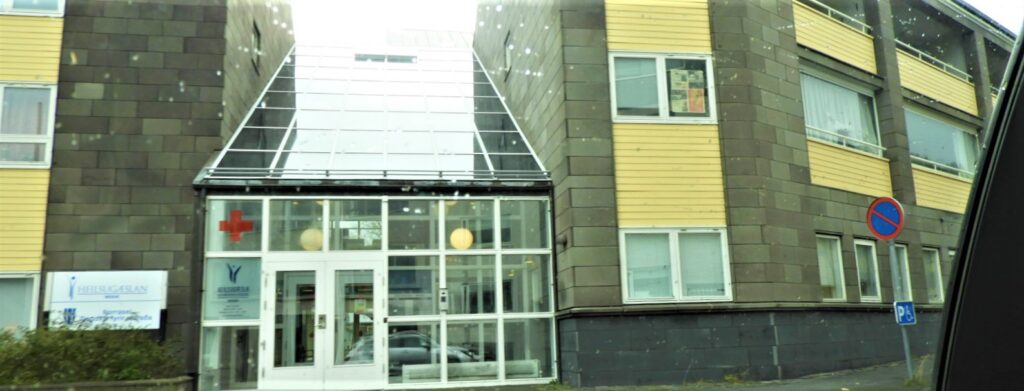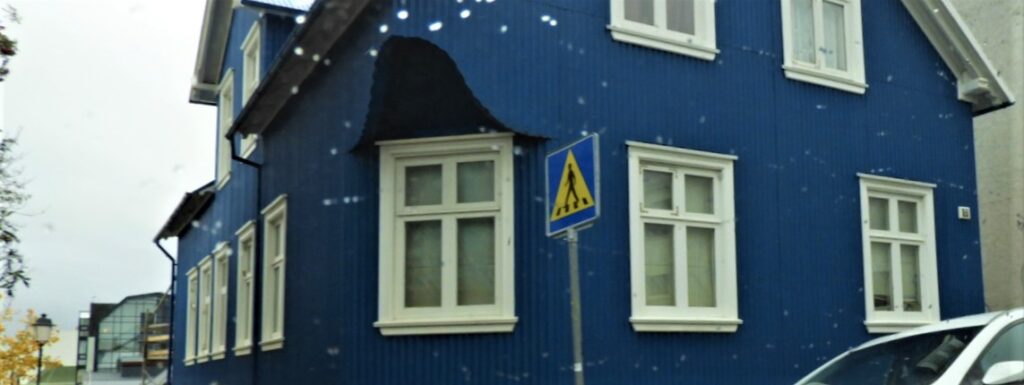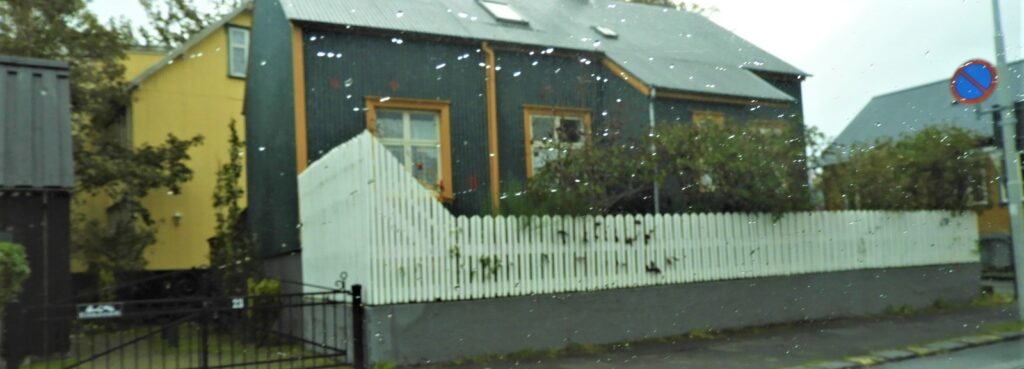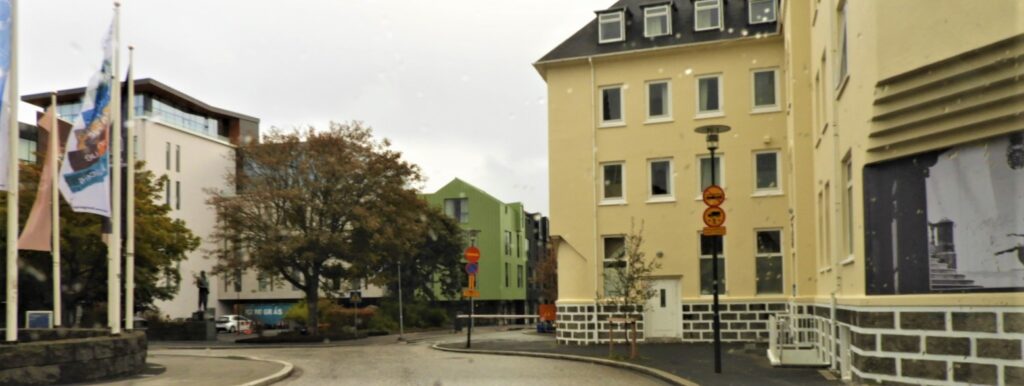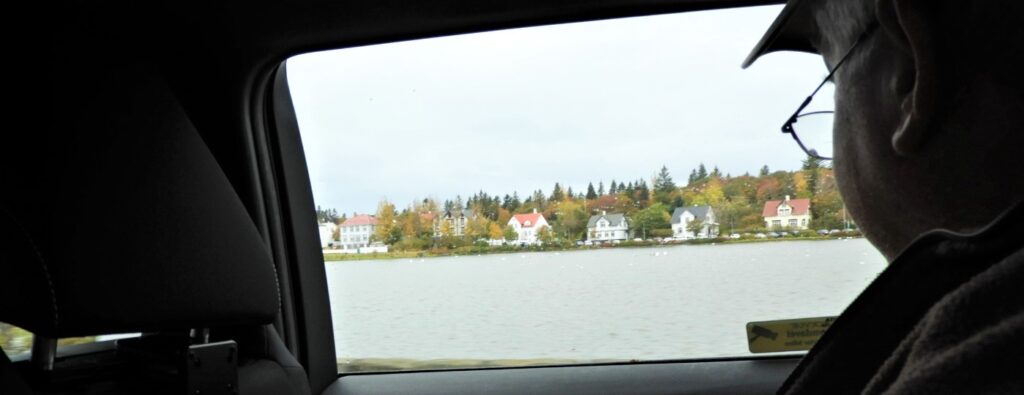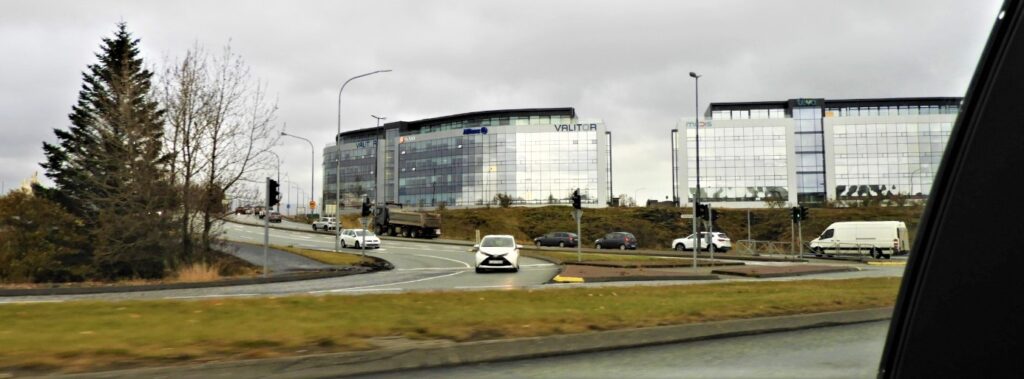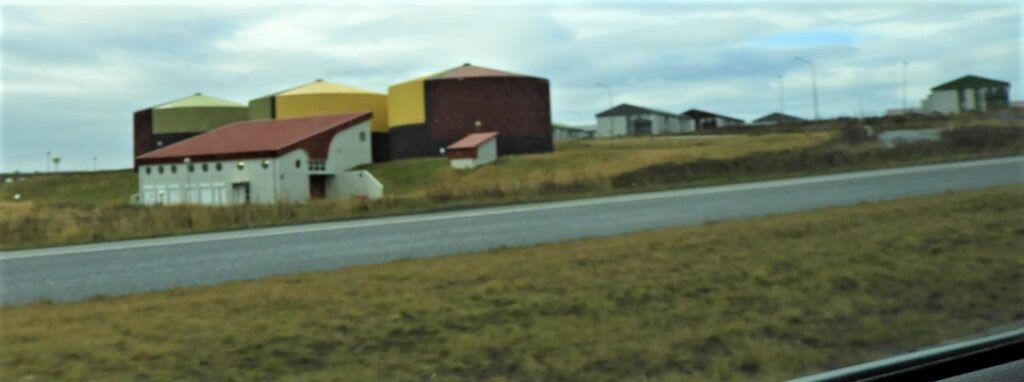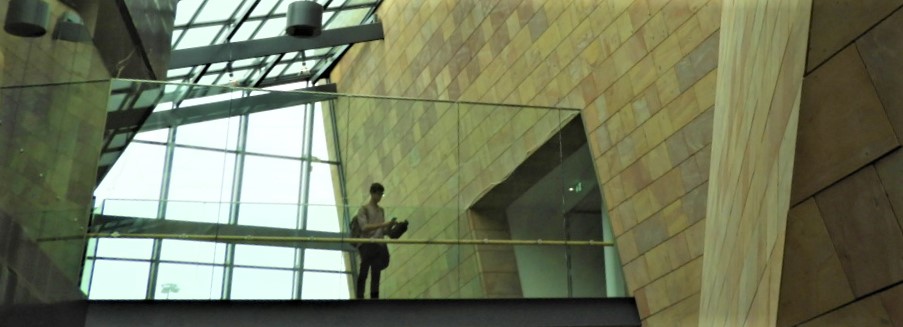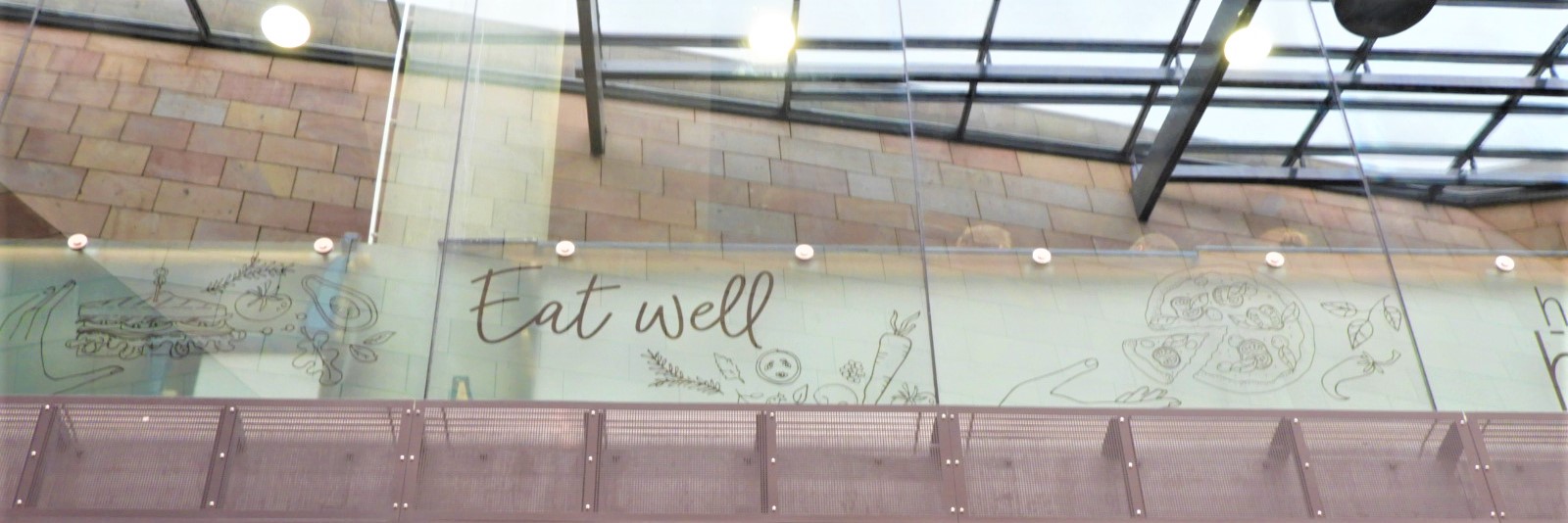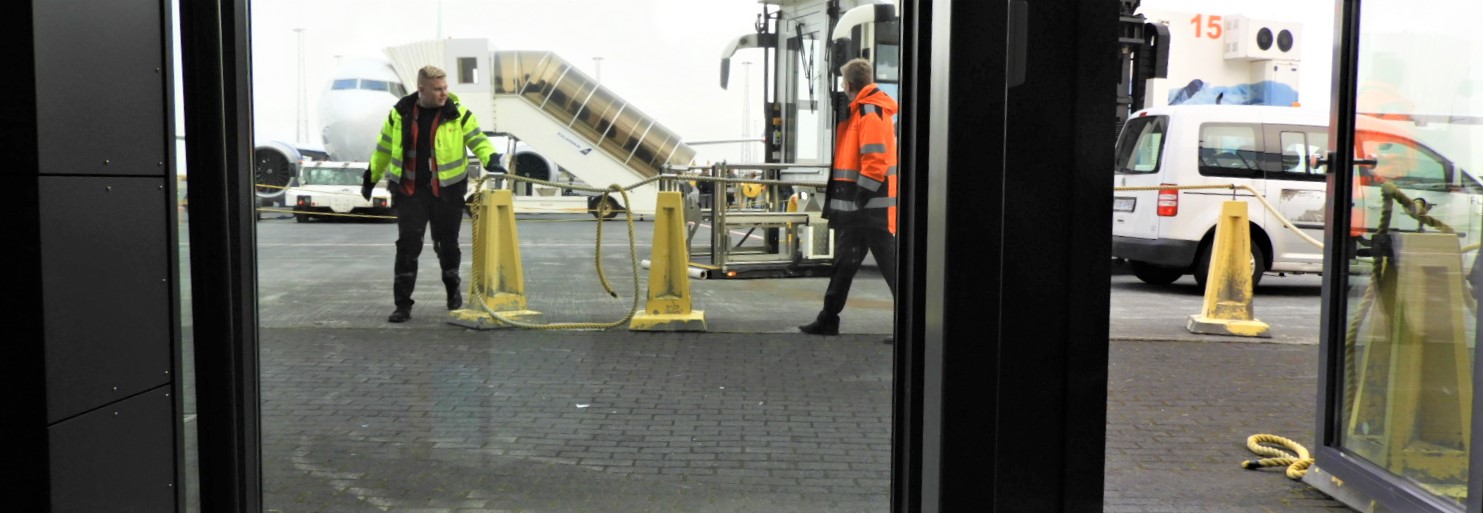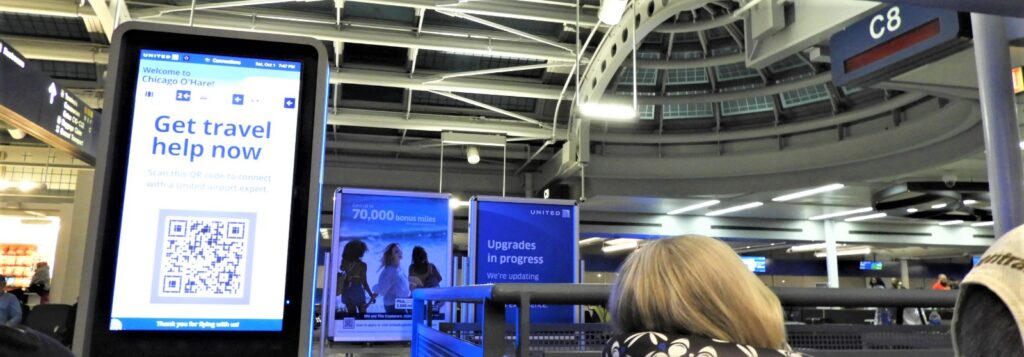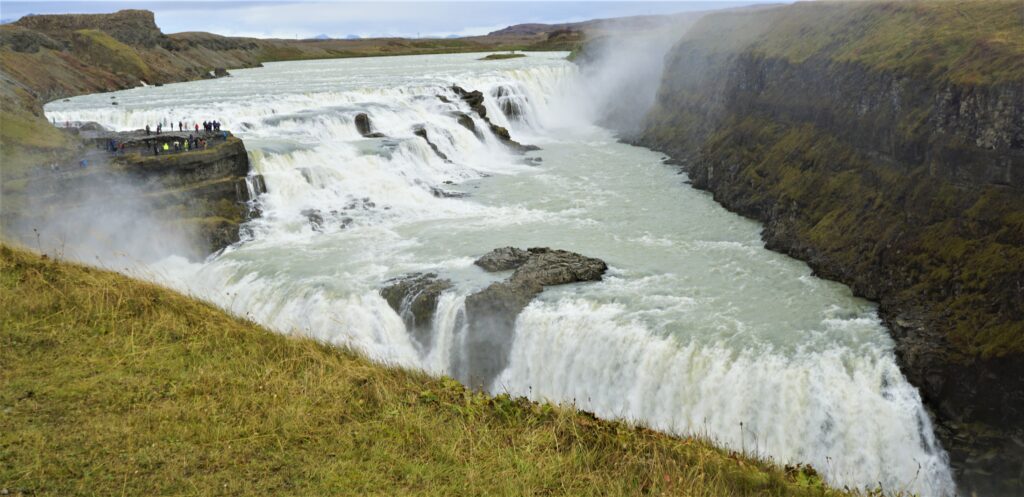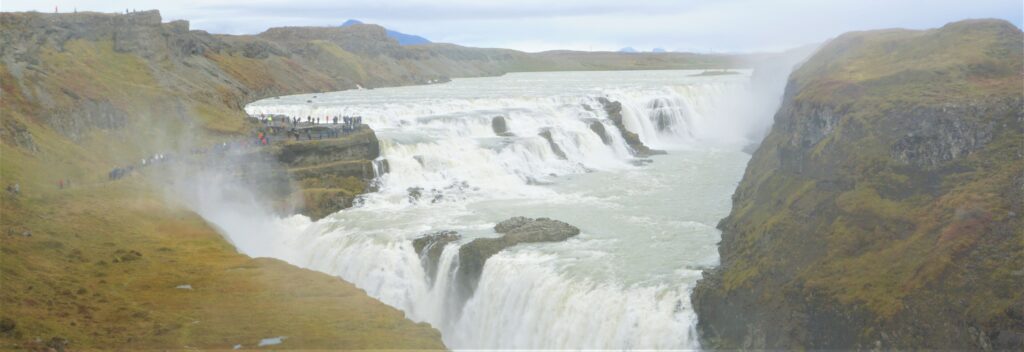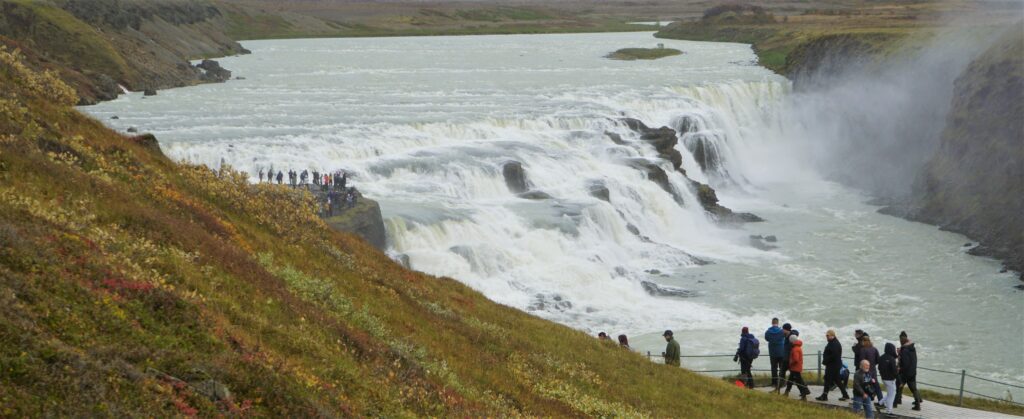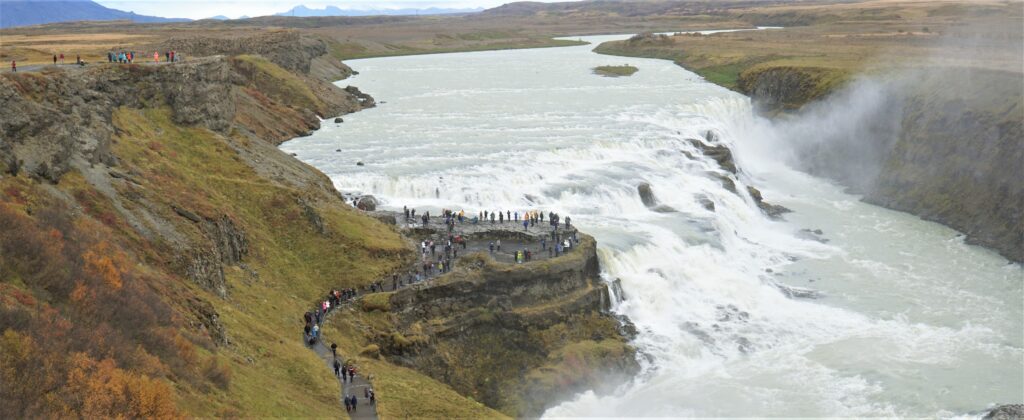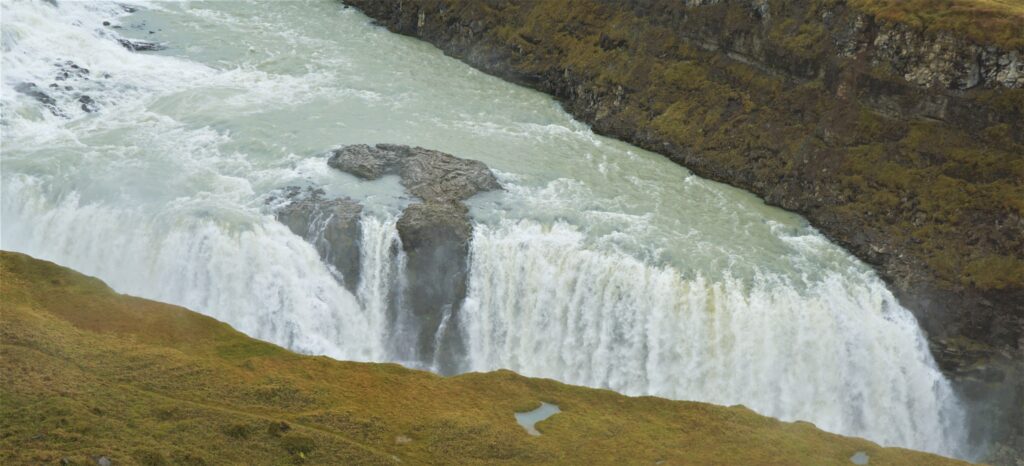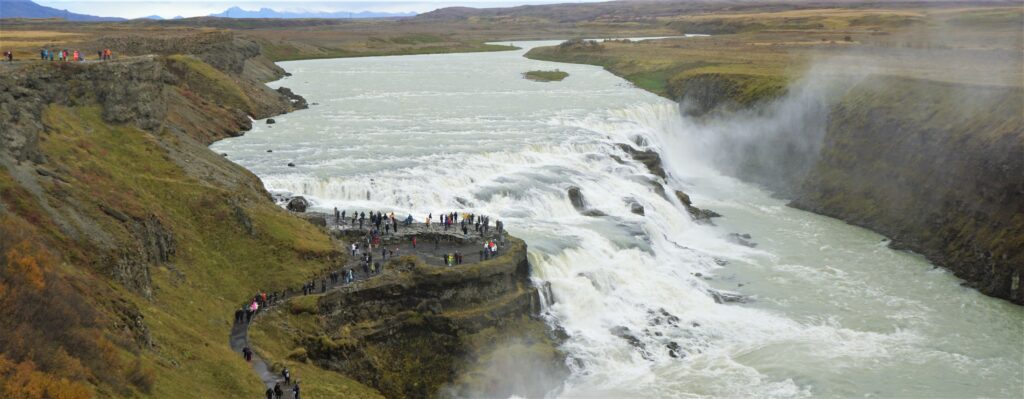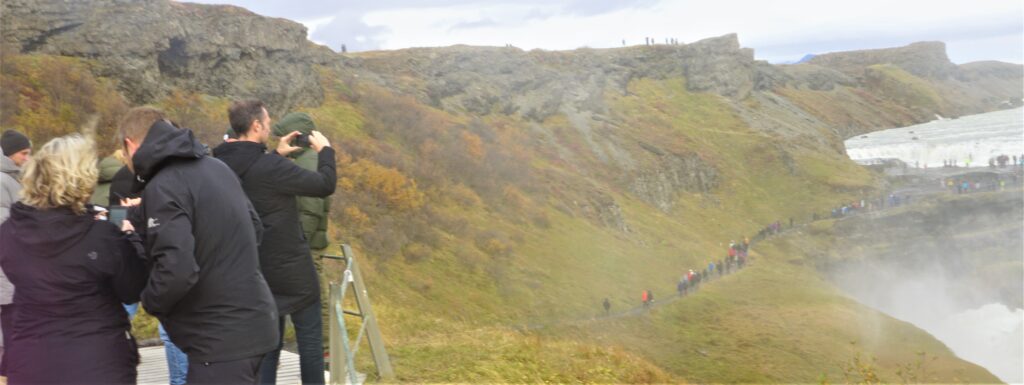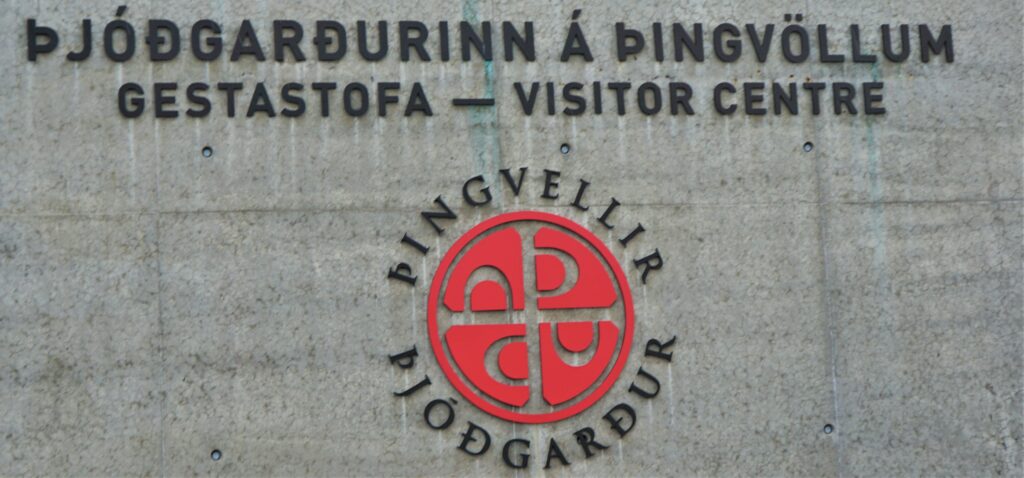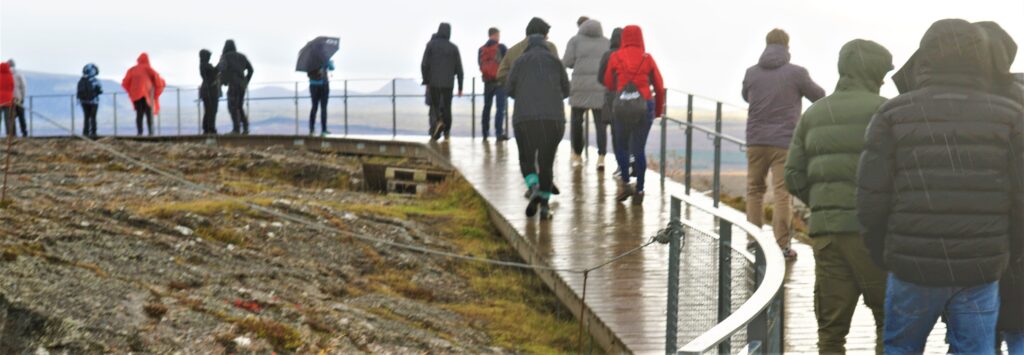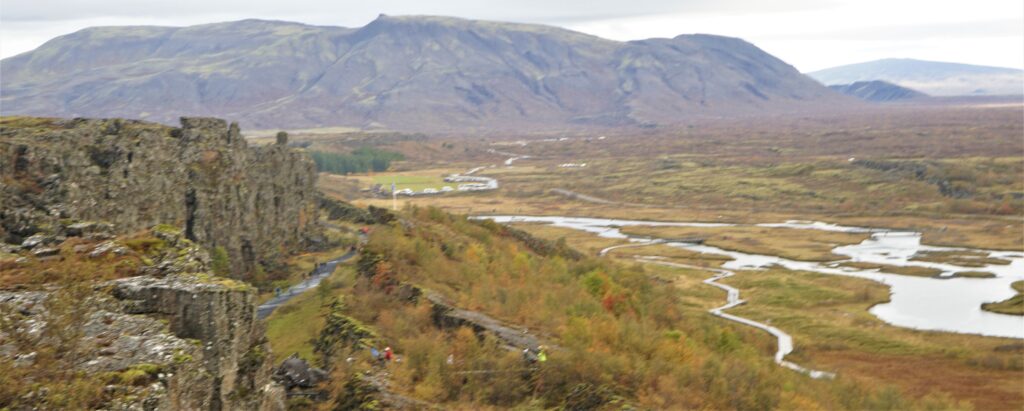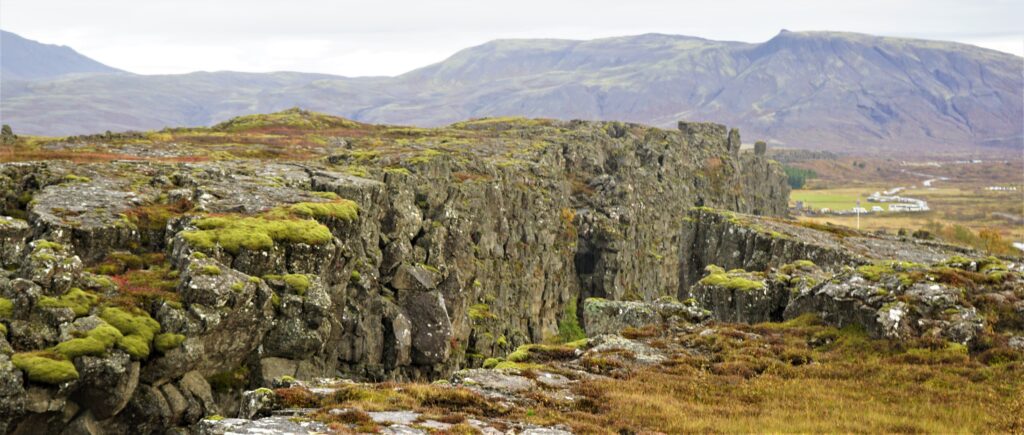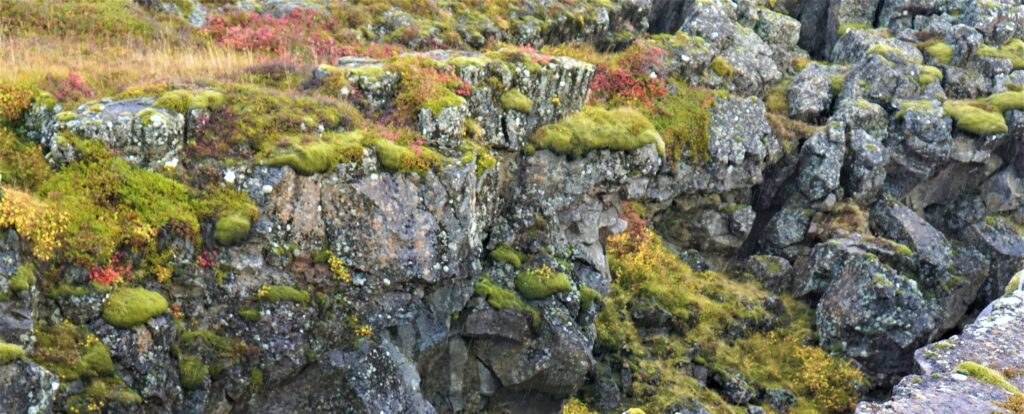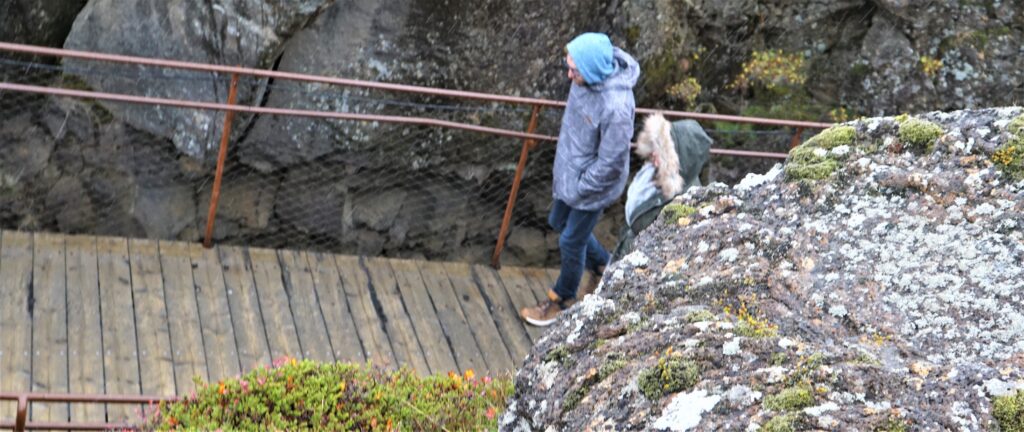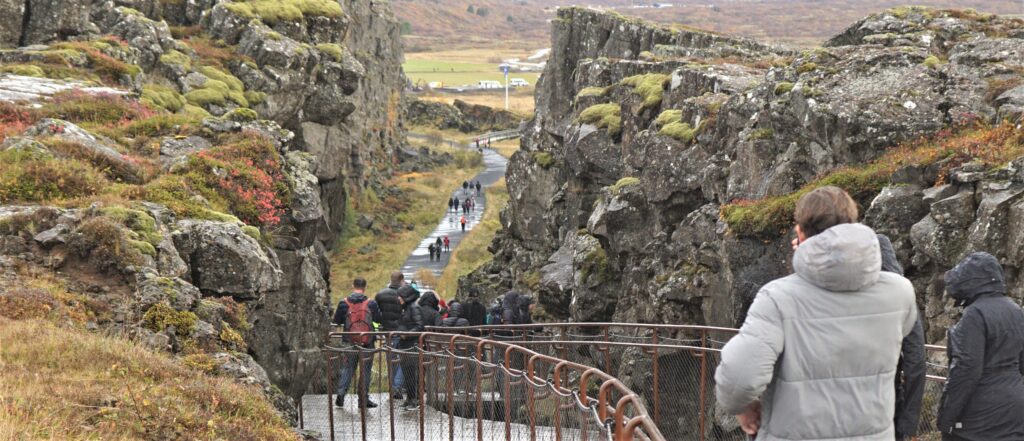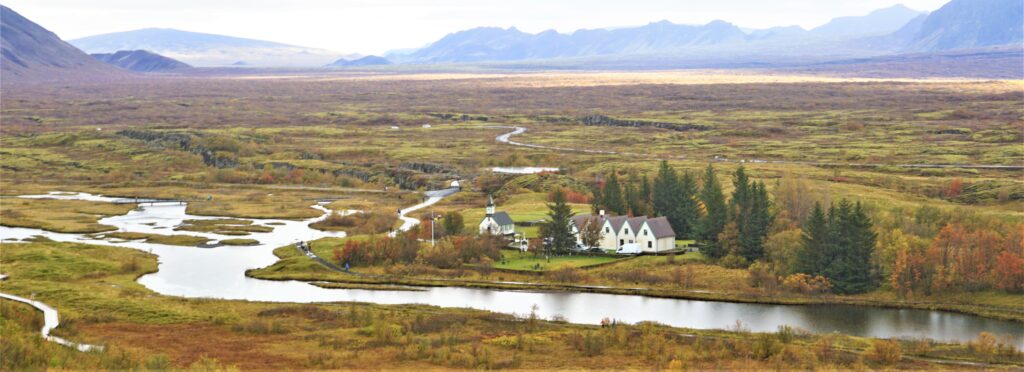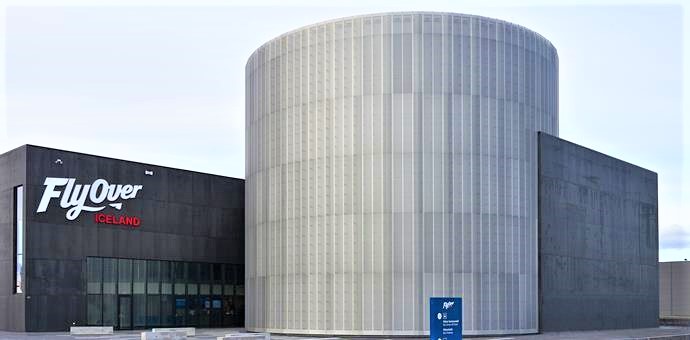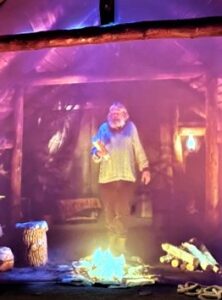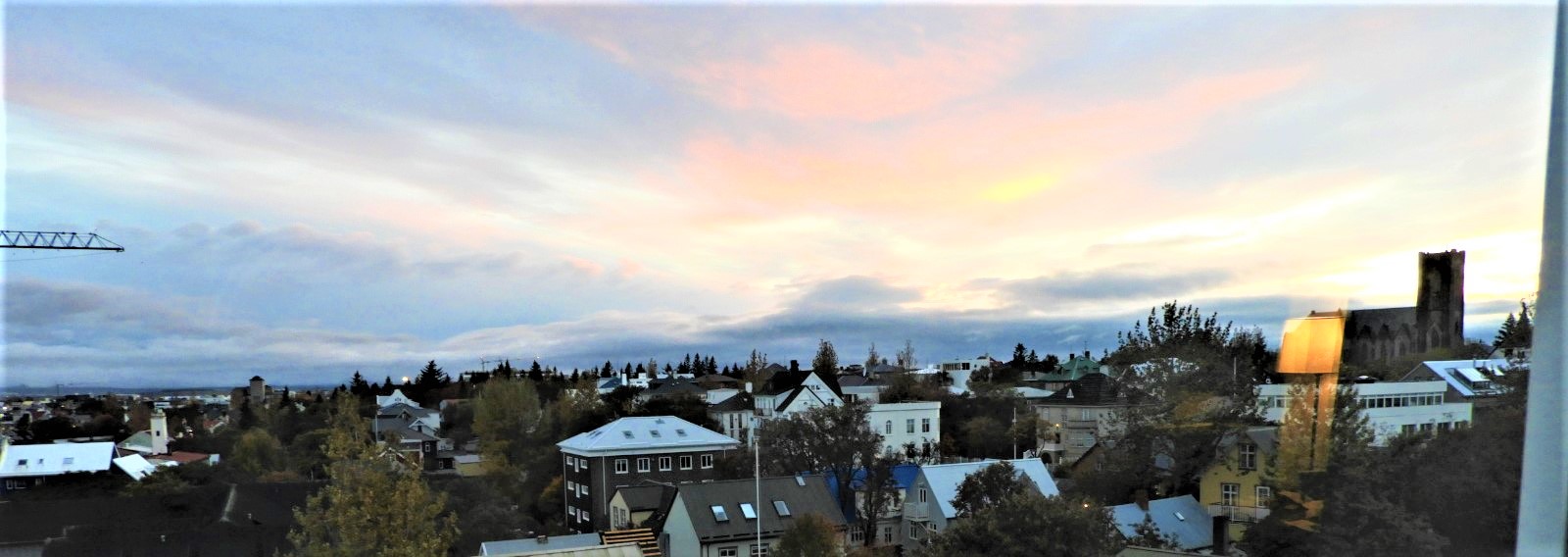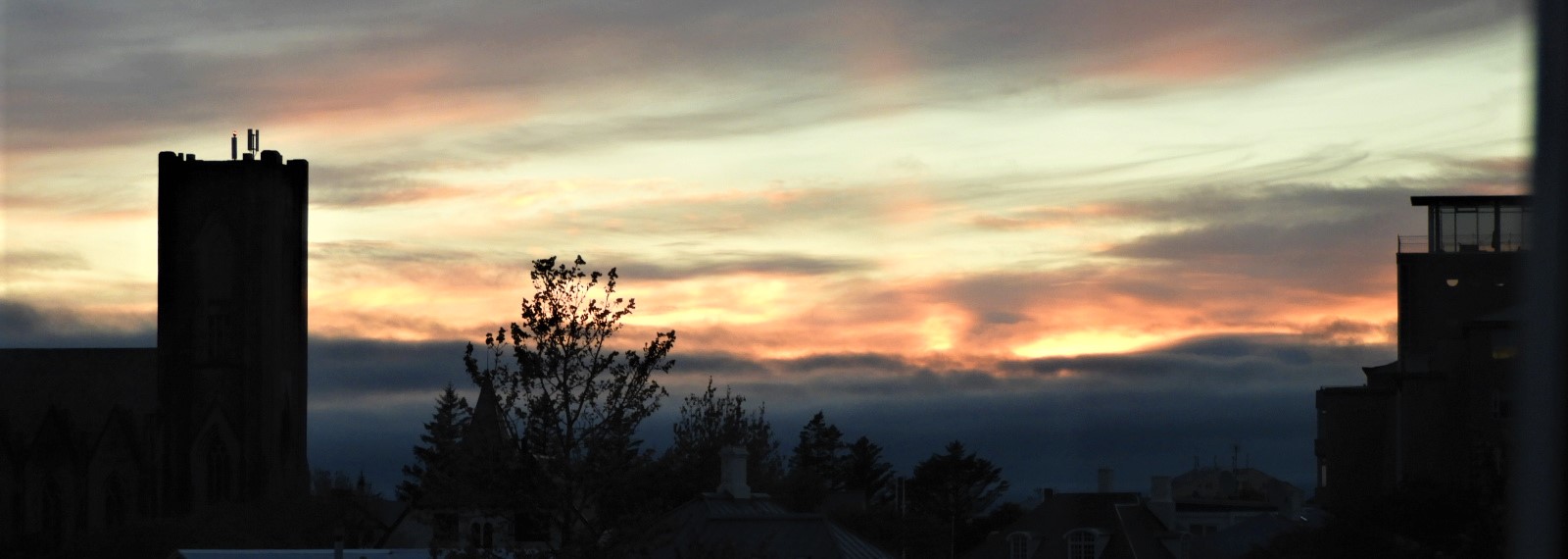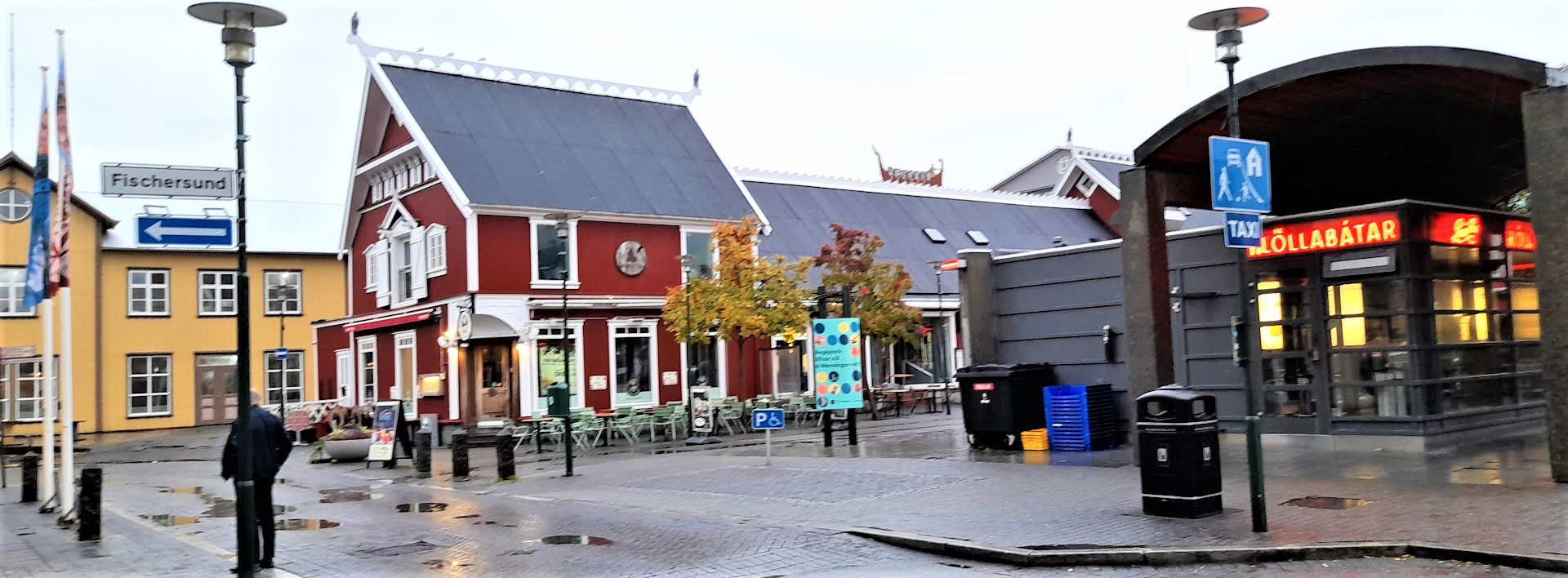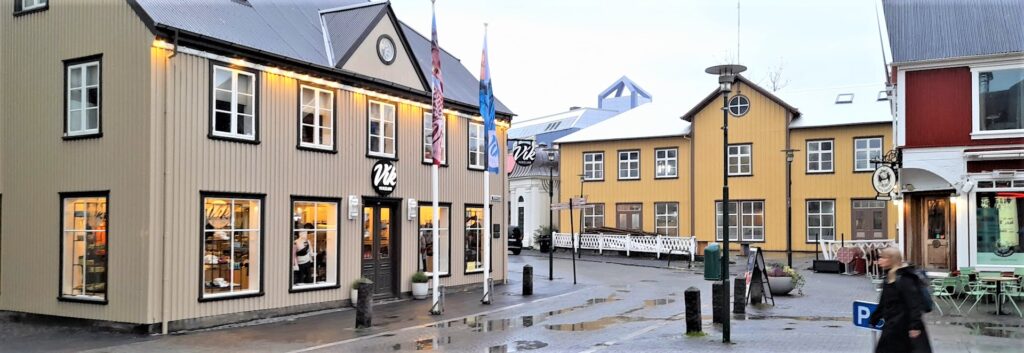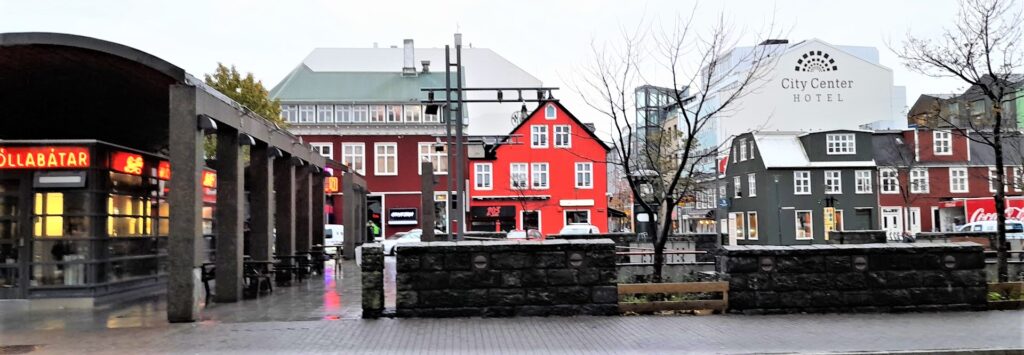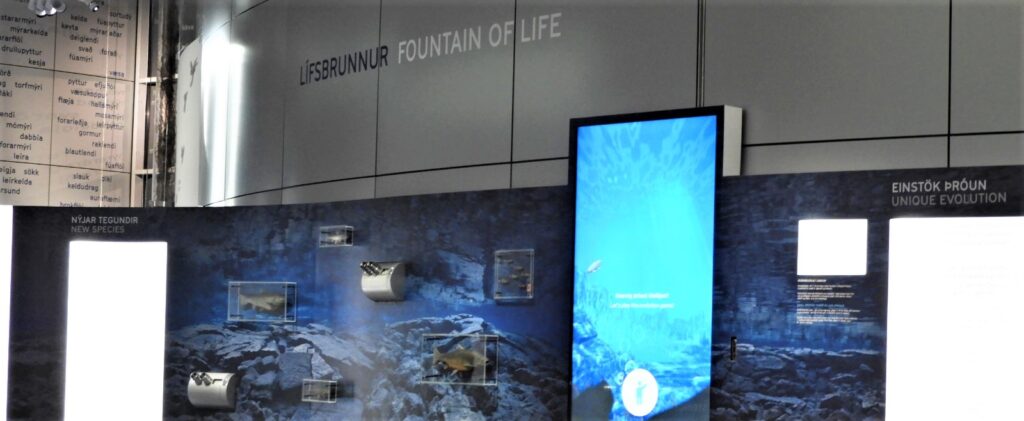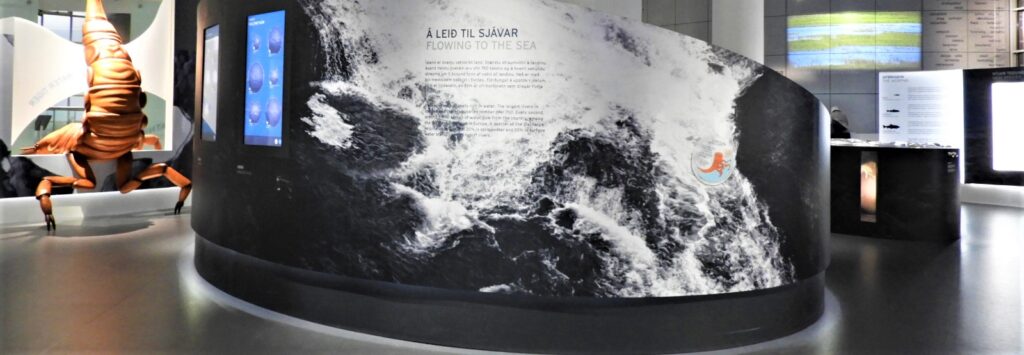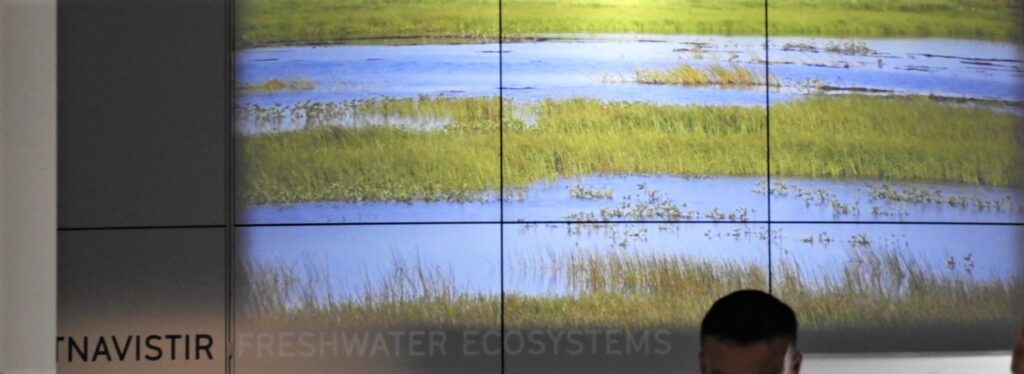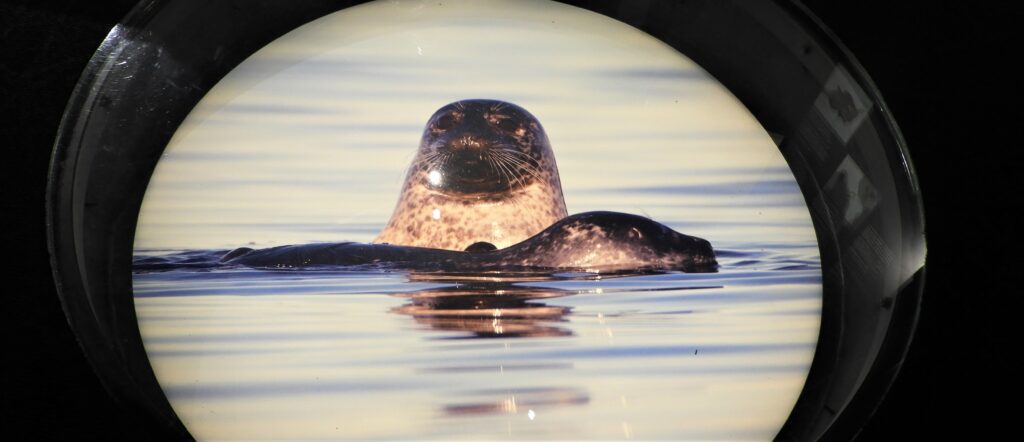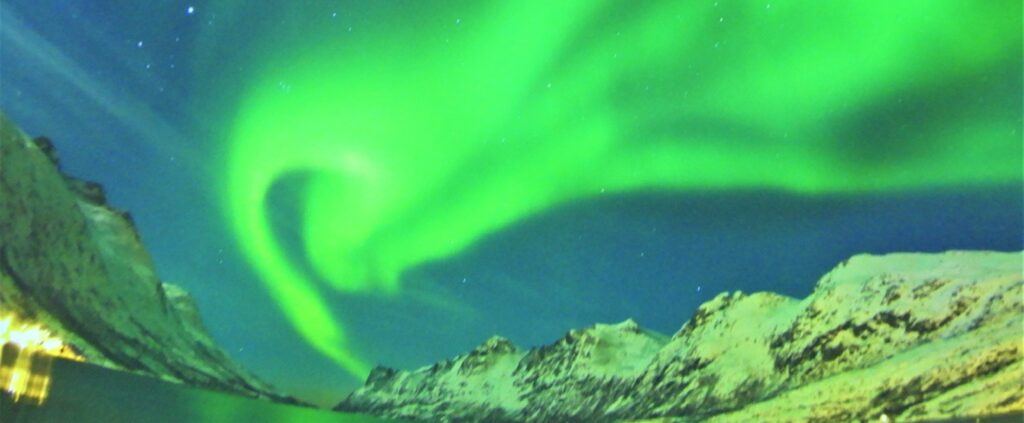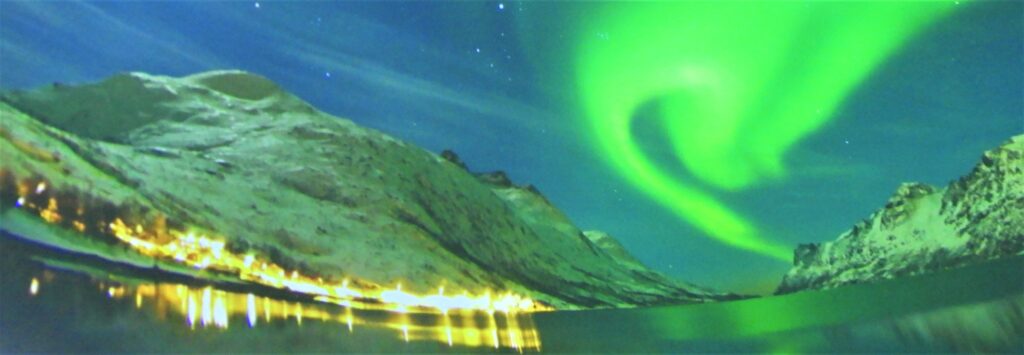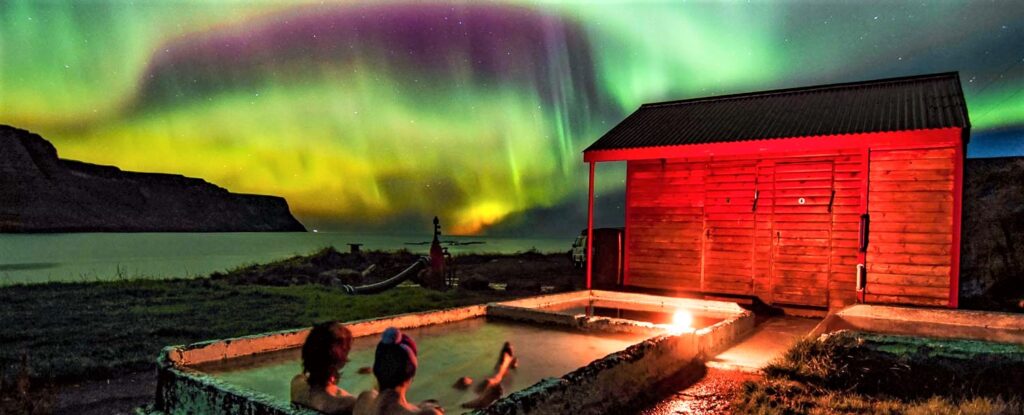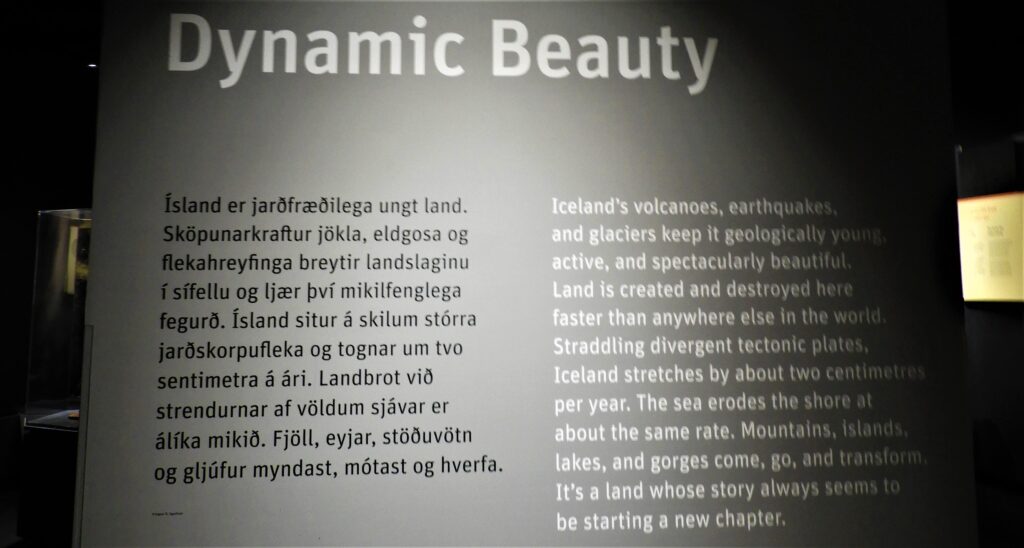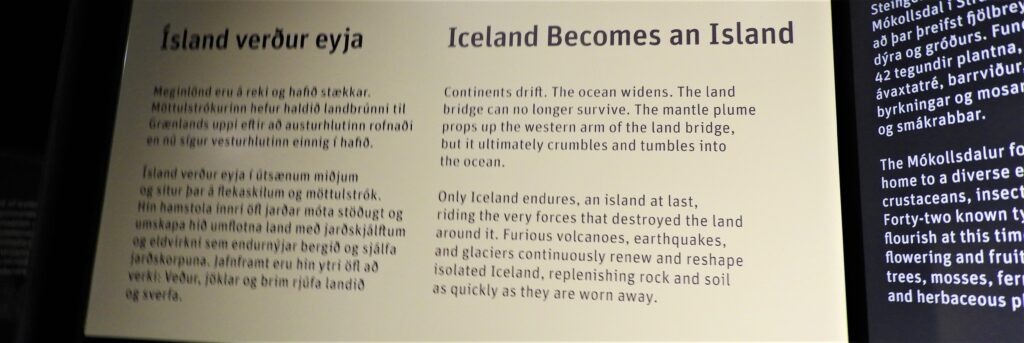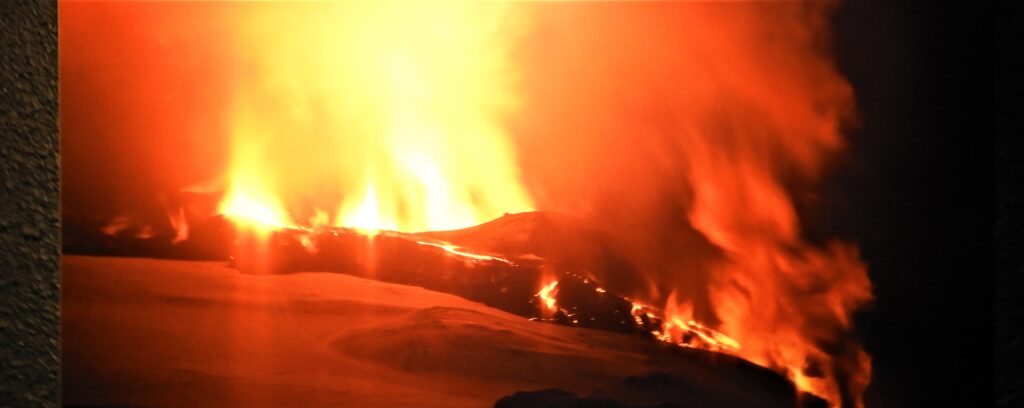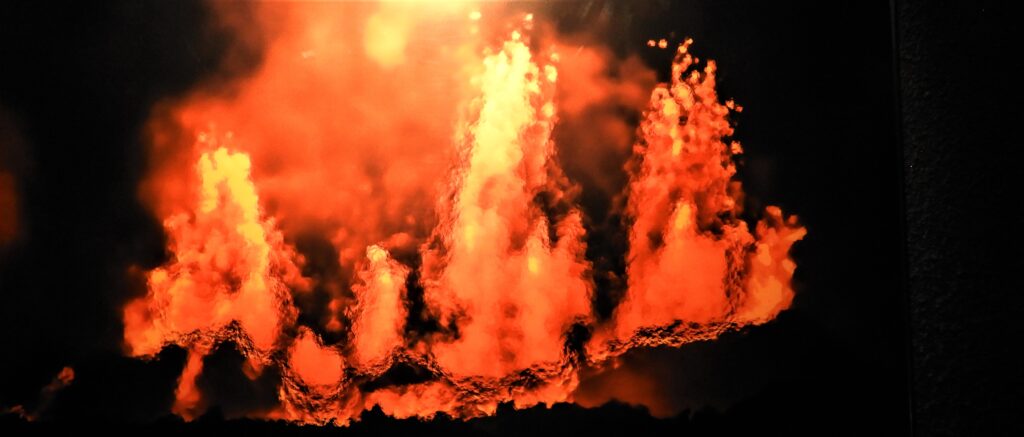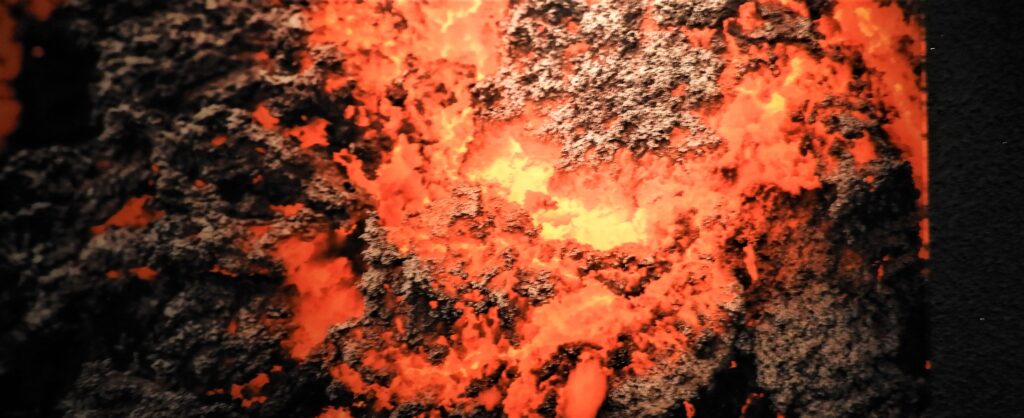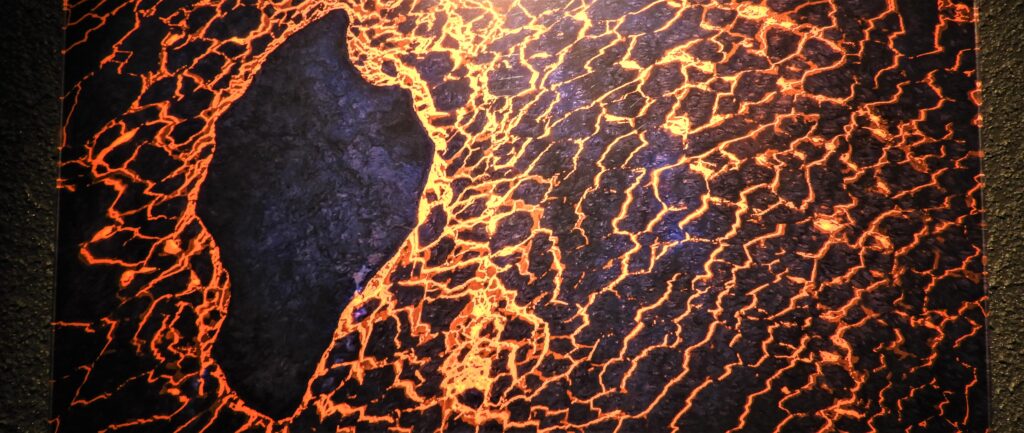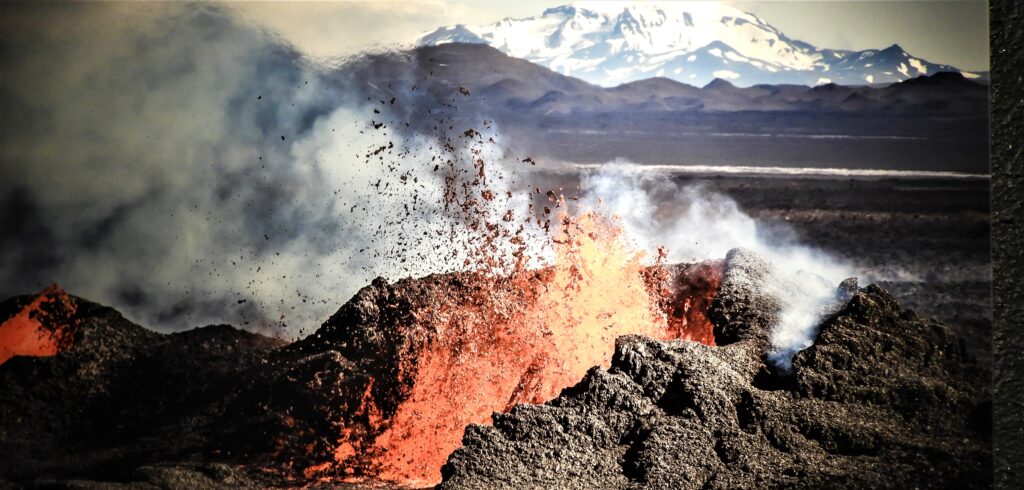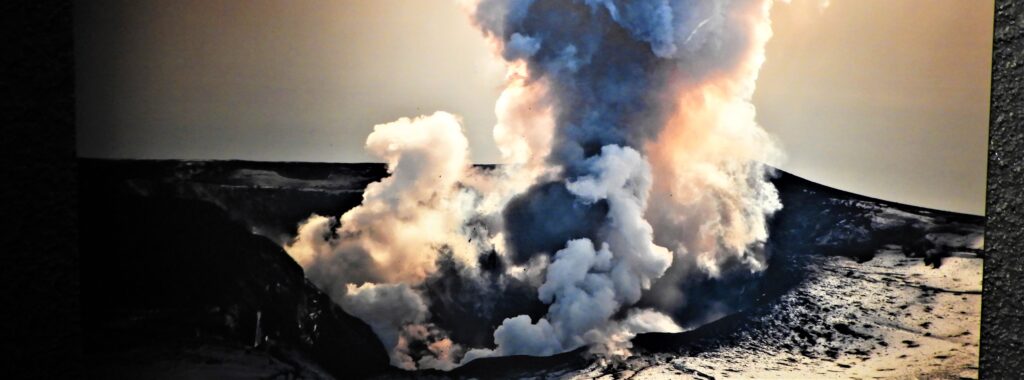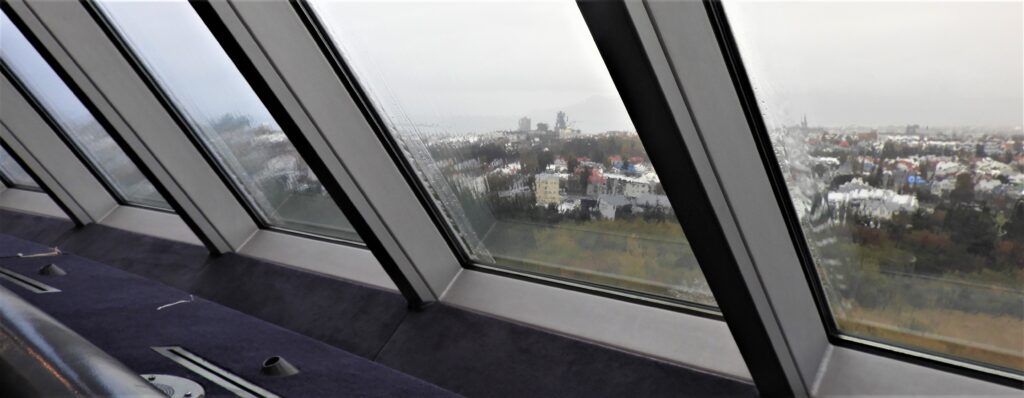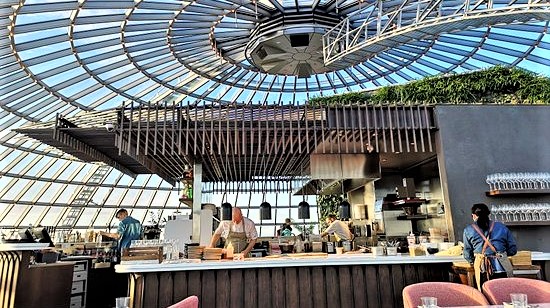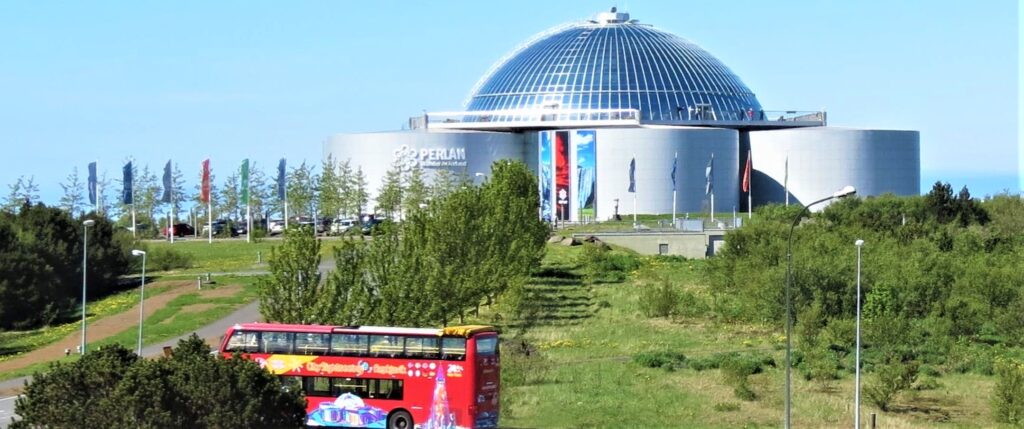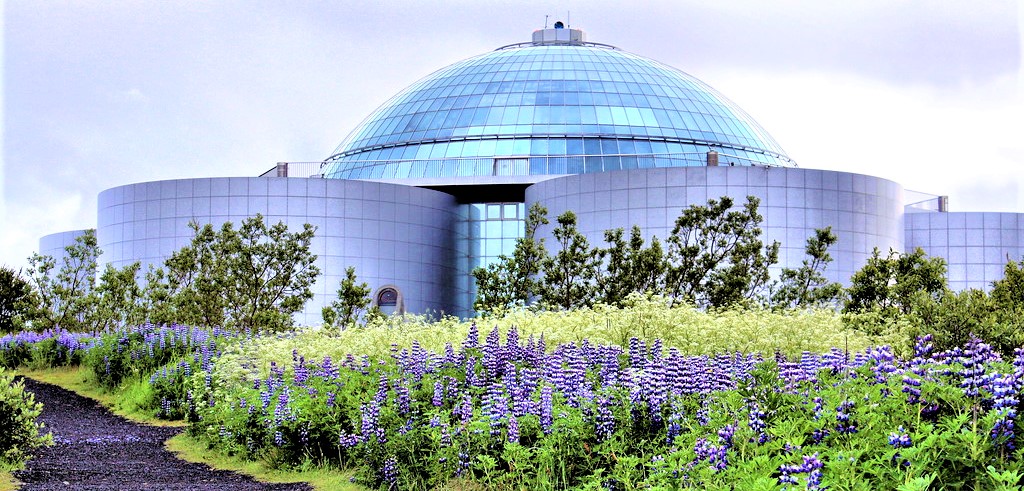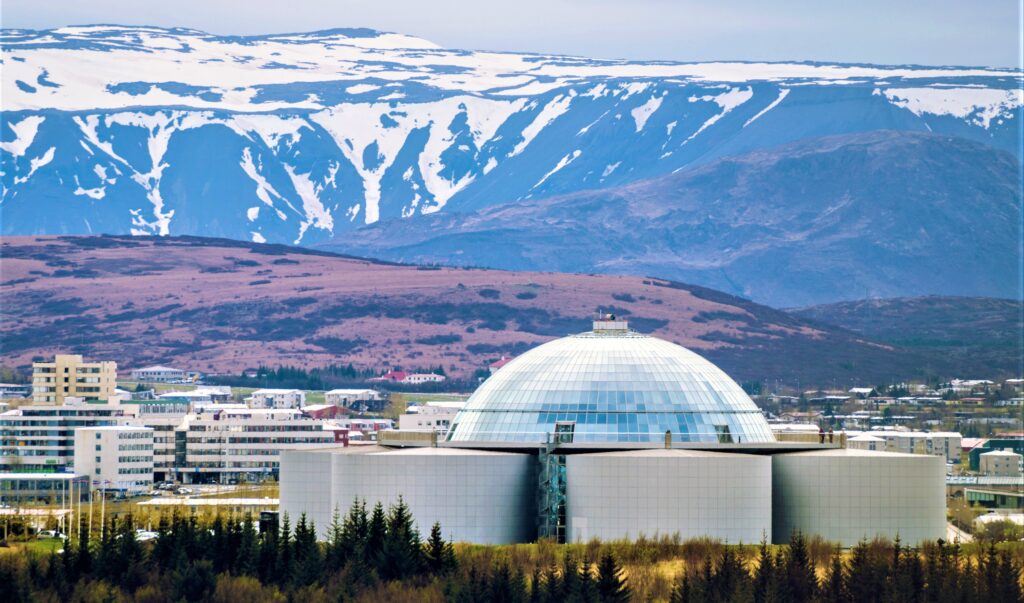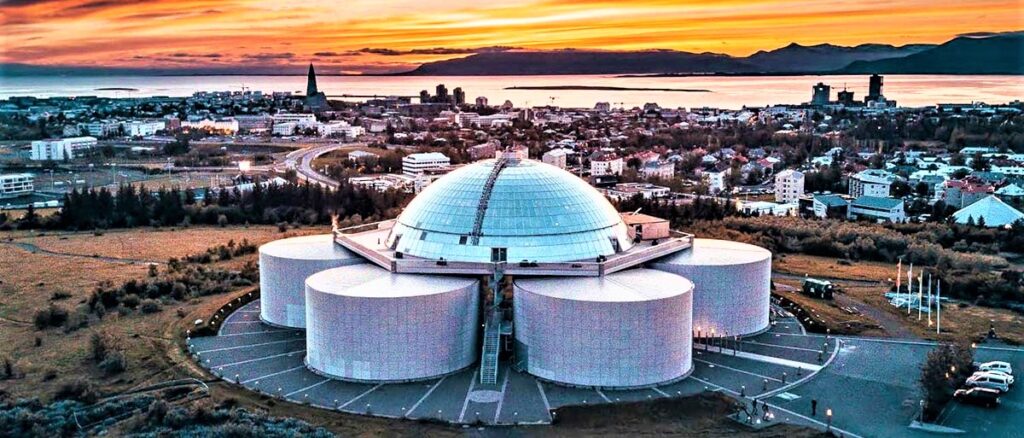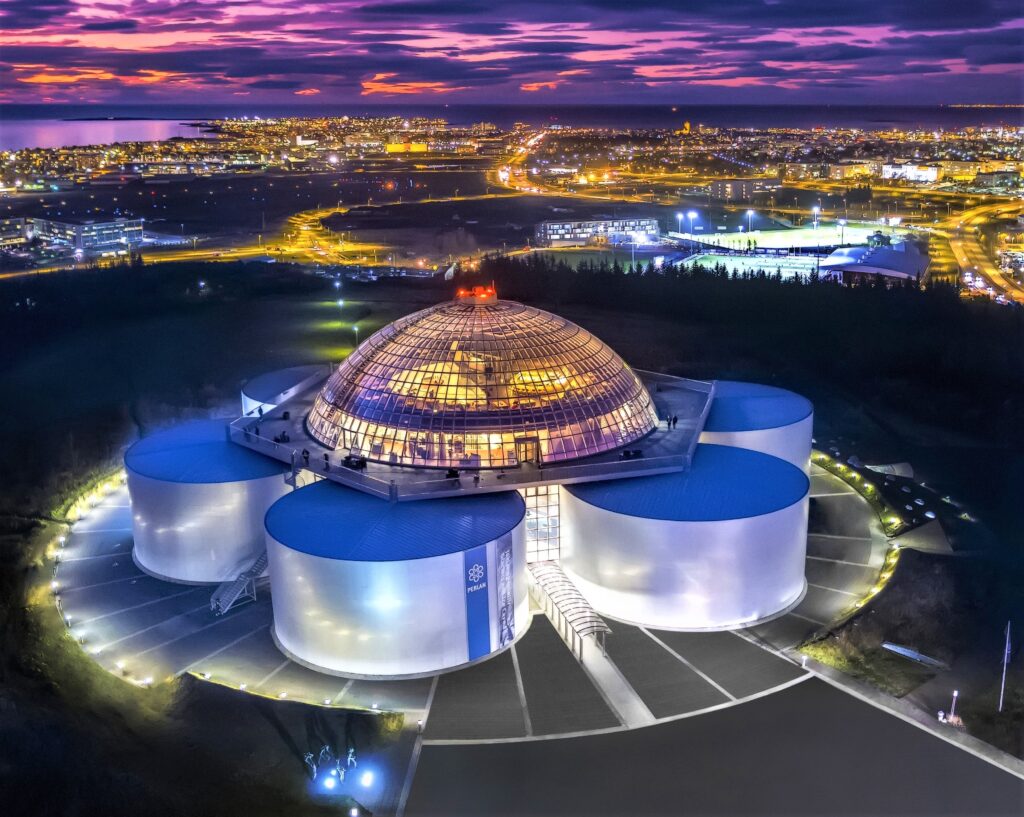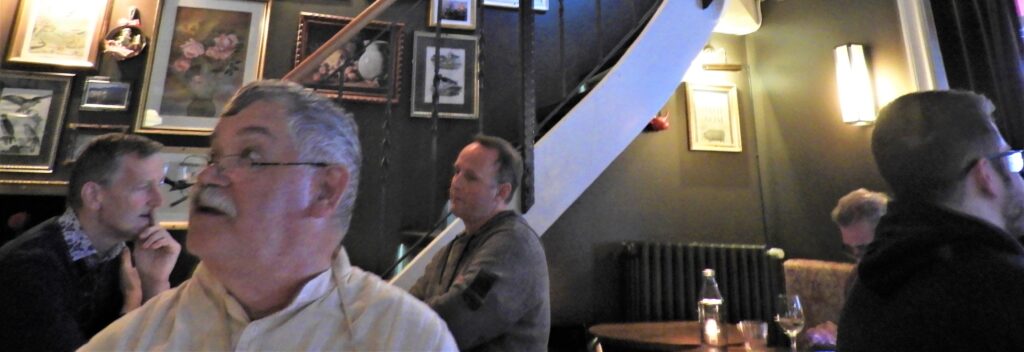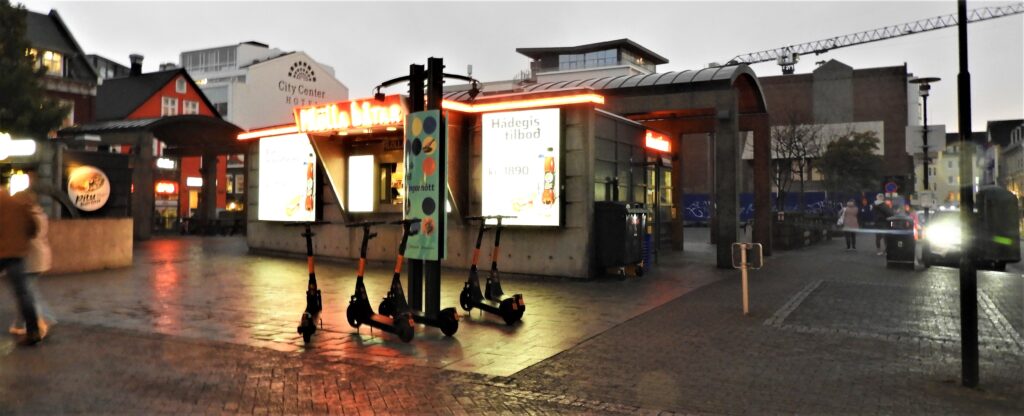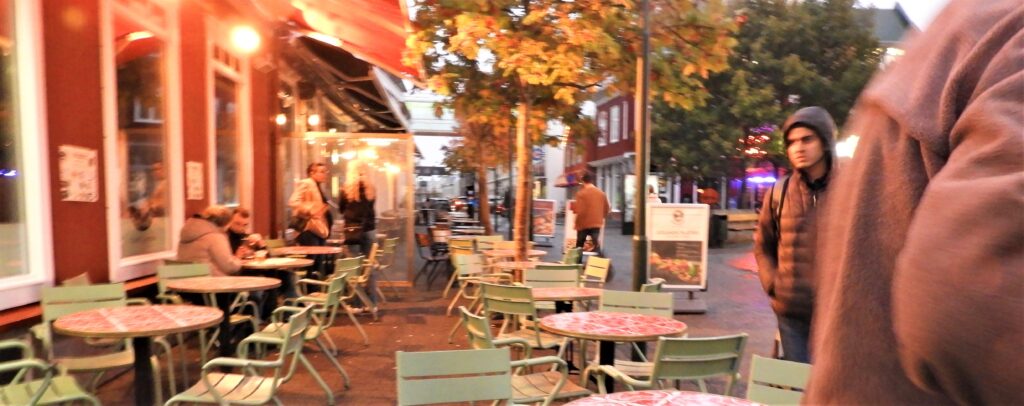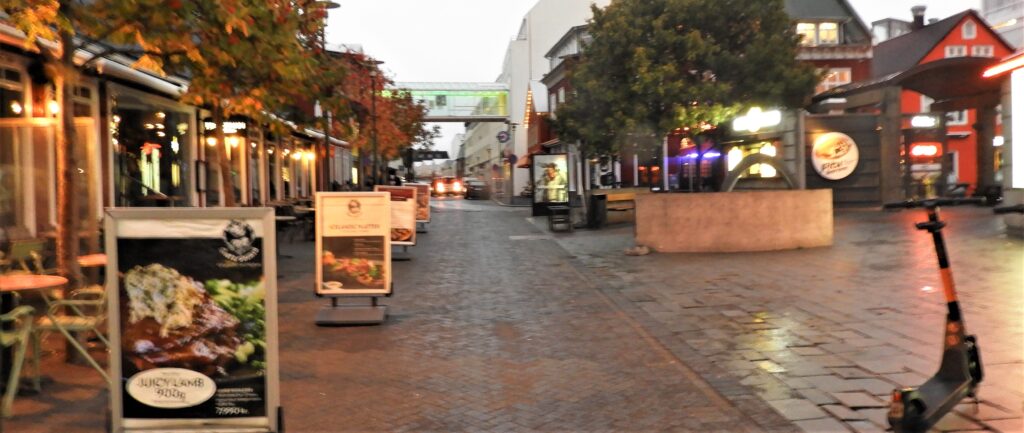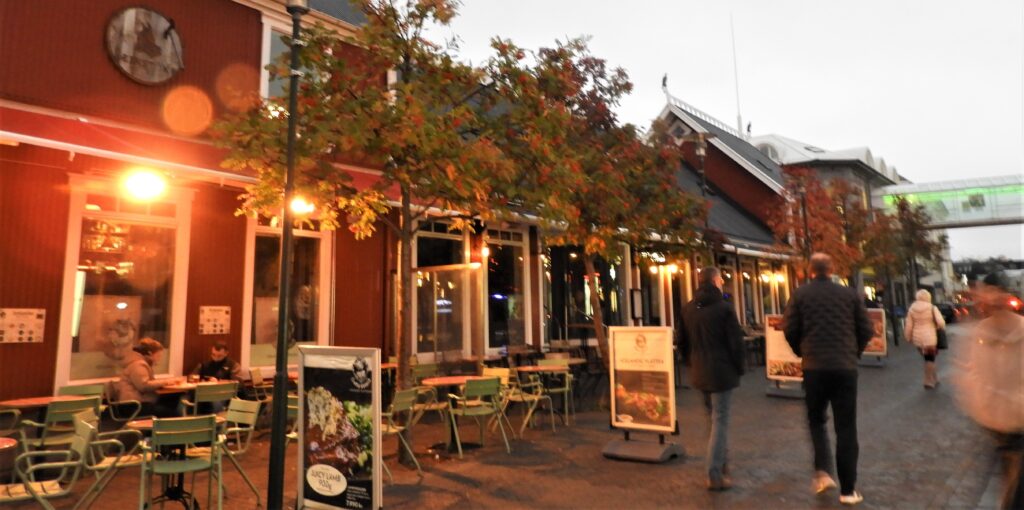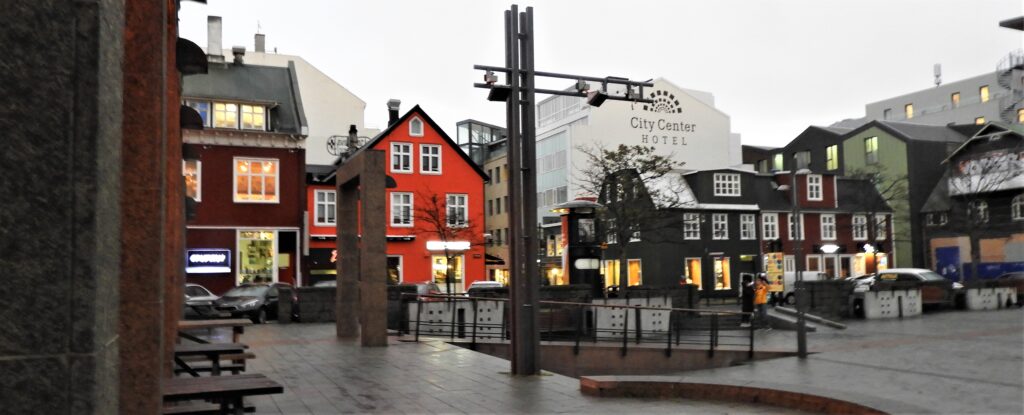Posts Tagged ‘Reykjavik’
» posted on Saturday, October 1st, 2022 by Linda Lou Burton
Had Wits, Did Travel
Linda Lou Burton posting from Little Rock, Arkansas, USA – I am home. Get out your calculator. If I woke up at 6 AM in Reykjavik, and sat down with my Katy cat at 11 PM in Little Rock, and Reykjavik is 6 hours ahead time-zone-wise, how long was I awake and on the road? Did you come up with 23 hours? This was a day of units, each unit a different world.
Unit 1 – Center Plaza Hotel & Leaving Reykjavik: Good warm breakfast, checking out (Did you sleep well? Please come back again!), taxi (we’ve learned, taxi drivers just aren’t chatty). The weather was gray and sprinkly; I took pictures of Reykjavik’s colorful buildings as we left the town I have now put on my “Must Visit Again” list, like Quebec City.
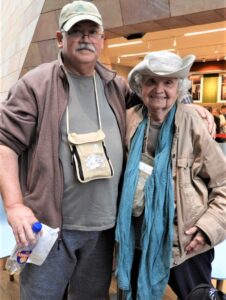 Unit 2 – The Reykjavik Airport: From the highway the terminal showed its colors, and, like Perlan, its openness to the sky, gray or blue. Inside everything was open, light, lively. Rick and I said our goodbyes here; his flight was 8 hours direct to Seattle; my flight was 6 hours to Chicago with a 2-hour layover, and then 2 hours to Little Rock. Our flights departed within 15 minutes of each other, so our last wait-times were at different gates. Note: I wore my scarf for warmth here, and not for its mosquito-repellent properties!
Unit 2 – The Reykjavik Airport: From the highway the terminal showed its colors, and, like Perlan, its openness to the sky, gray or blue. Inside everything was open, light, lively. Rick and I said our goodbyes here; his flight was 8 hours direct to Seattle; my flight was 6 hours to Chicago with a 2-hour layover, and then 2 hours to Little Rock. Our flights departed within 15 minutes of each other, so our last wait-times were at different gates. Note: I wore my scarf for warmth here, and not for its mosquito-repellent properties!
Gunnar got me to Gate 35; he was my transporter from checkin to boarding, pushing my wheelchair to all the right checkpoints and the most unusual boarding technique of the entire trip. There was no ramp from inside the building to inside the plane. They had an “elevator on wheels” for those who couldn’t climb the plane’s outside steps. They rolled me onto this device, hoisted the wheelchair UP to plane-door height, and then eased my platform snug against the plane’s far side to a door right behind the pilot! Someone took my bag and stored it; someone helped me to my seat; an aisle seat beside a pleasant young couple from Madison, Wisconsin, fun to talk with and helpful all the way. Only flaw in the flight? No food for free– not even a tiny bag of Goldfish. Somehow I missed this fact when I booked. They had plenty of food, which they cooked to special order for those who pulled out their credit card. Note for future Iceland Air flights: pack some crackers.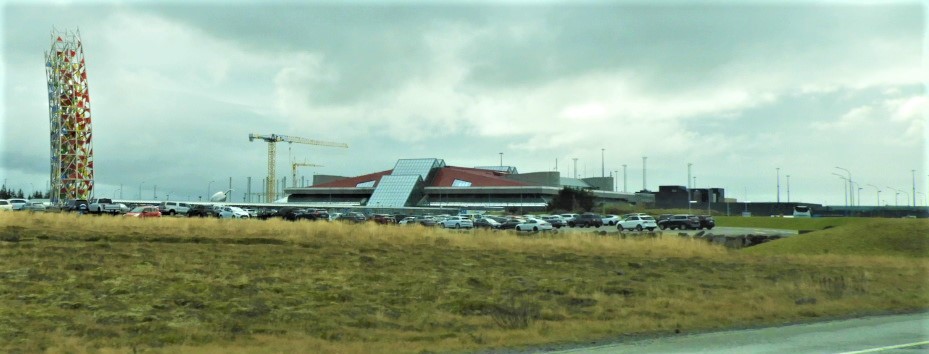
Unit 3 – The Chicago Airport: Wheelchair waiting in Chicago. I had two hours to get to my United flight somewhere far away. Enter Paul. He’d only worked there 5 months, but Paul knew his way around O’Hare! He pushed me over half of Chicago as we went up and down elevators, walkways, checkpoints, customs, every known hindrance to man or beast, and got me to my United gate with 15 minutes to spare. I don’t know how he did it! He got the biggest tip of anyone on the entire trip. In fact, I tipped him once and thought about the miracle he pulled and then tipped him again. My United flight to Little Rock, no sweat, small plane on home grounds, a coke and pretzels standard fare.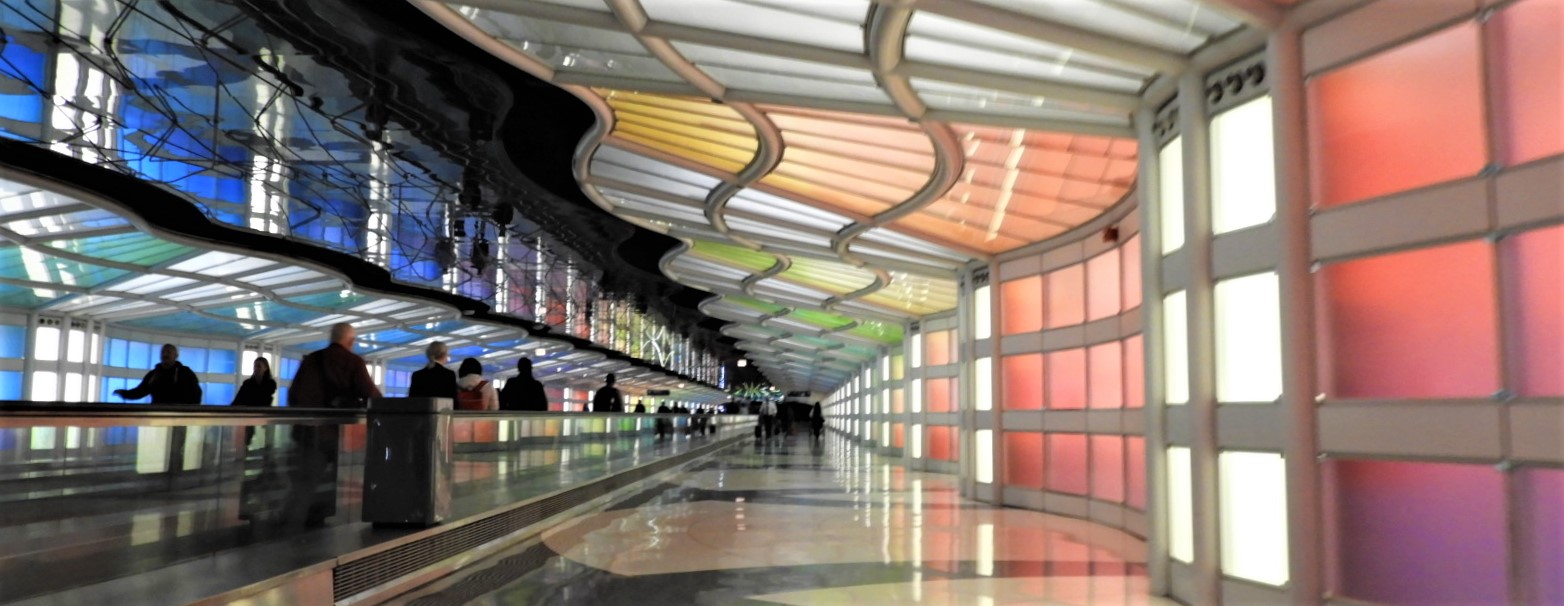
Unit 4 – Little Rock: My familiar Clinton airport where this journey began 24 days ago. People were waiting to help; a kind man with a wheelchair and smiles and questions about where I’d been pushed me all the way to dear friend Tracy’s waiting car; good bye! Tracy drove me home under an Arkansas full harvest moon, a 15-minute trip. She lugged fancy-schmancy inside, gave me some welcome-home flowers, and made a quick exit, as my eyes were of their own accord closing fast (which sometimes happens after 23 hours).
Katy cat came out of hiding and gave me an accusatory look. “Just where on God’s green earth have you been for 24 days?” it said. “You won’t believe it,” I told her, my eyes blurry now. “Just give me time to get my wits back.”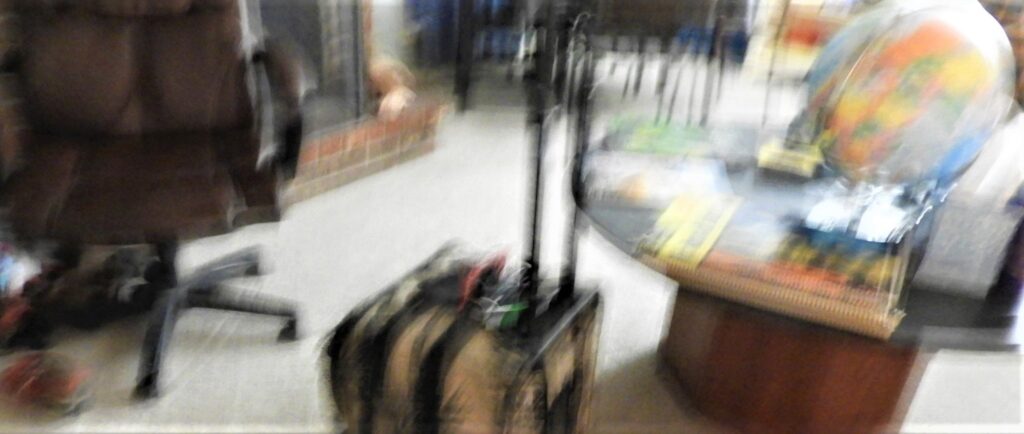
Next Post: The Vitamin C Story
» posted on Saturday, October 1st, 2022 by Linda Lou Burton
Sons and Dottirs
Linda Lou Burton posting from Center Hotels Plaza, Reykjavik, Iceland – It’s that foggy-brain time between waking up and getting up. Icelandic names are on my agenda today, as promised. I talked about the Horse Naming Commission yesterday. Well, there is a people naming group too — the Icelandic Naming Committee — and its duty is approving, or not, FIRST names not previously used in Iceland. Why? Protecting the Icelandic language is a primary reason; names must contain only letters found in the Icelandic alphabet. Okay, I get that. But why the emphasis on FIRST names? Icelanders operate on a first-name basis. It’s hard 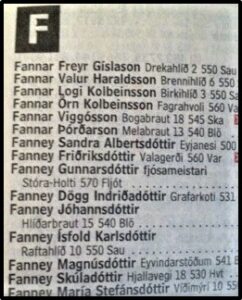 for Americans to grasp that notion, even with all its own informality. Browse the Icelandic phone book and you’ll find alphabetical listings by first name. So what about the last name, the surname? Iceland doesn’t follow the naming conventions you’ll find in much of the Western world; it uses a patronymic, and sometimes matronymic system. That mean a child’s surname is made up from a father’s first name with the child’s gender at the end of that. Example: my father’s name is Craig Burton. Had I been born in Iceland, my name would be Linda Craigsdottir, not Linda Burton. And my brothers surnames would be Craigsson. Sometimes the mother’s name makes up part of the surname — perhaps if Mother wishes to end ties to Father, or if Mother chooses to make a social statement about the issue. And in 2019, the laws were broadened so a child can be registered as “gender neutral” by adding the suffix “bur” (child of) to either parents first name instead of “son” or “dottir.” Got all of that?
for Americans to grasp that notion, even with all its own informality. Browse the Icelandic phone book and you’ll find alphabetical listings by first name. So what about the last name, the surname? Iceland doesn’t follow the naming conventions you’ll find in much of the Western world; it uses a patronymic, and sometimes matronymic system. That mean a child’s surname is made up from a father’s first name with the child’s gender at the end of that. Example: my father’s name is Craig Burton. Had I been born in Iceland, my name would be Linda Craigsdottir, not Linda Burton. And my brothers surnames would be Craigsson. Sometimes the mother’s name makes up part of the surname — perhaps if Mother wishes to end ties to Father, or if Mother chooses to make a social statement about the issue. And in 2019, the laws were broadened so a child can be registered as “gender neutral” by adding the suffix “bur” (child of) to either parents first name instead of “son” or “dottir.” Got all of that?
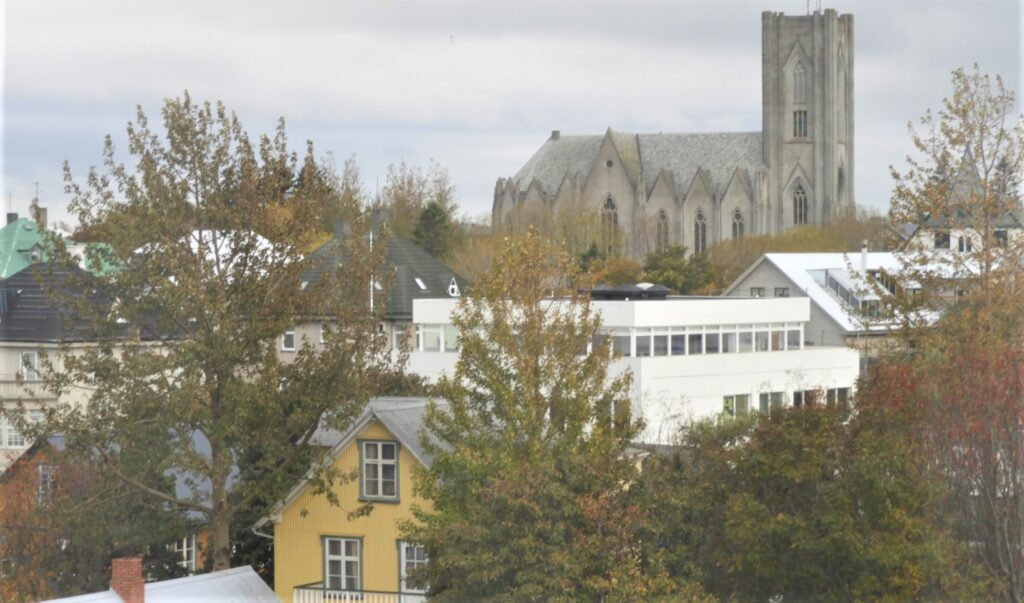 I’m fully awake now, looking out my window and trying to sort this in my mind, so I googled some Icelandic names on the Government website; here are a few government officials, listed
I’m fully awake now, looking out my window and trying to sort this in my mind, so I googled some Icelandic names on the Government website; here are a few government officials, listed 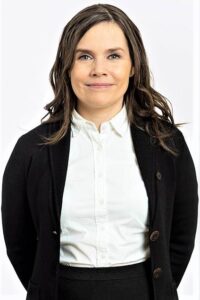 alphabetically by first name, including the Prime Minister, Katrín Jakobsdóttir, pictured right.
alphabetically by first name, including the Prime Minister, Katrín Jakobsdóttir, pictured right.
- Áslaug Arna Sigurbjörnsdóttir Minister of Higher Education, Science and Innovation
- Gudlaugur Thór Thórdarson Minister of the Environment, Energy and Climate
- Guðmundur Ingi Guðbrandsson Minister of Social Affairs and the Labour Market / Minister for Nordic Cooperation
- Katrín Jakobsdóttir Prime Minister
- Thórdís Kolbrún Reykfjörd Gylfadóttir Minister for Foreign Affairs
- Willum Þór Þórsson Minister of Health
 Easy to pick out the boys and the girls just from the surnames! Speaking of gender, Iceland has once again been named the world’s “most gender equal country,” in the World Economic Forum’s Global Gender Gap Report 2022. Of Iceland’s university undergraduates 60% are women; of Masters 70%. Forty-two percent of management positions are held by women; 45% of all parliamentarians are female. And in a professional setting, that “first-name” practice is the norm, regardless of rank or position or surname. Icelanders are independent; it’s why those Vikings fled Norway, remember? Sons and Dottirs are doing well here.
Easy to pick out the boys and the girls just from the surnames! Speaking of gender, Iceland has once again been named the world’s “most gender equal country,” in the World Economic Forum’s Global Gender Gap Report 2022. Of Iceland’s university undergraduates 60% are women; of Masters 70%. Forty-two percent of management positions are held by women; 45% of all parliamentarians are female. And in a professional setting, that “first-name” practice is the norm, regardless of rank or position or surname. Icelanders are independent; it’s why those Vikings fled Norway, remember? Sons and Dottirs are doing well here.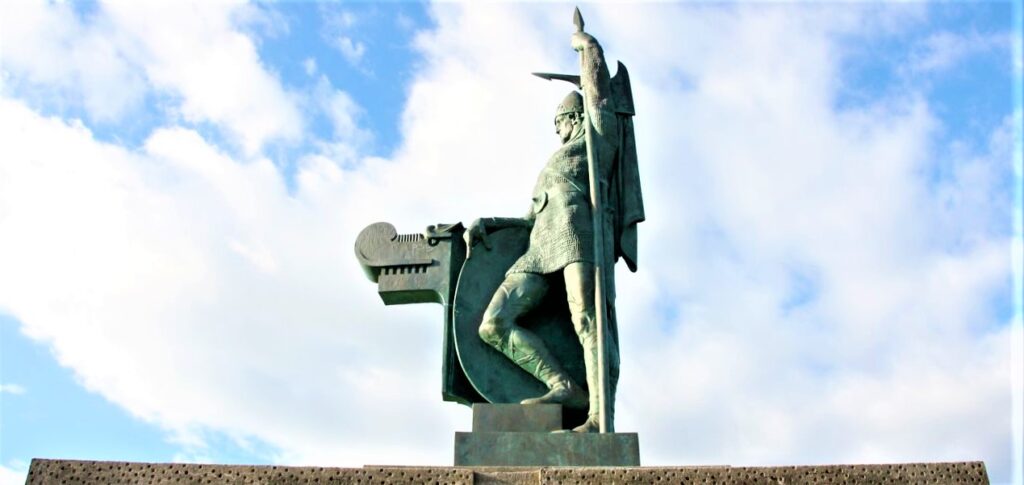
I have to admit to being gobswoggled by all the interesting and unique facts about this tiny county in the North Atlantic no bigger than the US state of Virginia, with a population about the same as St Louis, or Miami. I’ll be doing more studying when I get home. If I can reach my coat hanger that is, to pack. Was this coatrack put up here by a Viking? Stretch, stretch….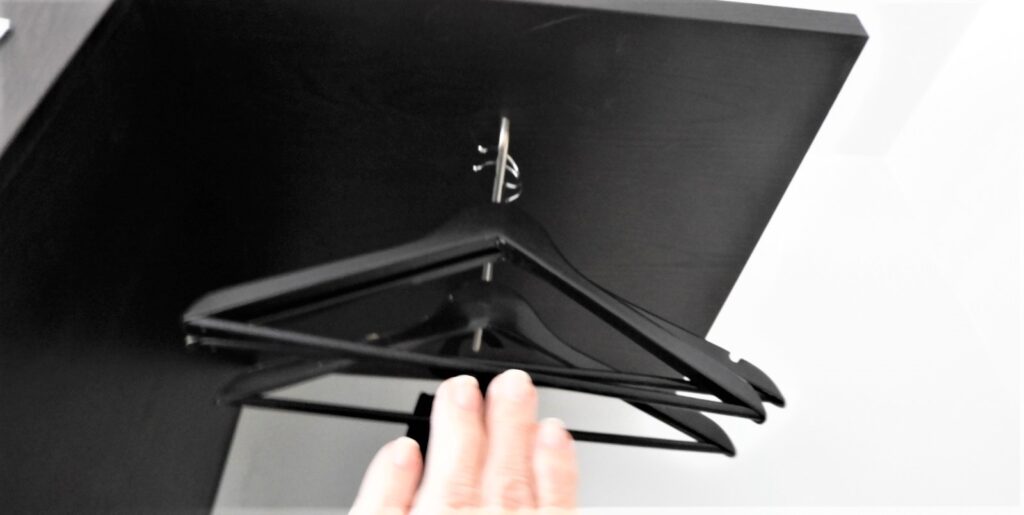
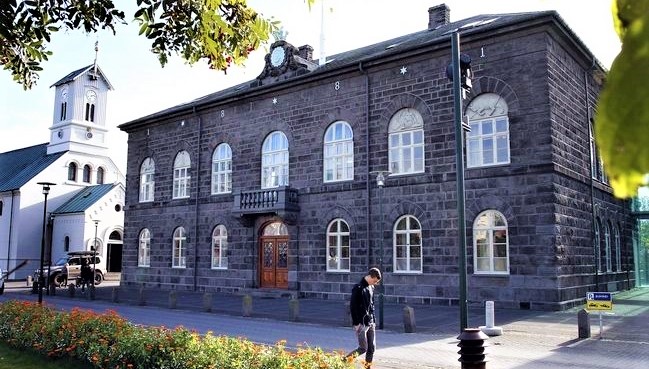 Iceland’s Parliament Building, which I haven’t seen yet. I’m coming back, I promise.
Iceland’s Parliament Building, which I haven’t seen yet. I’m coming back, I promise.
Government of Iceland https://www.government.is/
Center Hotels Plaza, Reykjavik, Iceland https://www.centerhotels.com/en/hotel-plaza-reykjavik
Next Post: Had Wits, Did Travel
» posted on Friday, September 30th, 2022 by Linda Lou Burton
A Horse Of Course
Linda Lou Burton posting from Center Hotels Plaza, Reykjavik, Iceland – No, it’s not a 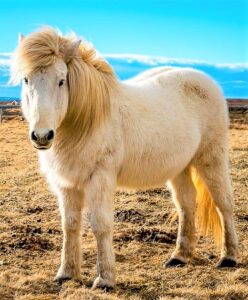 pony! Icelandic horses are small –52-56 inches tall, which is often considered “pony size” but make no mistake, this unique animal is a horse. It’s the only breed of horse in Iceland; Icelandic law does not allow horses to be imported into the country, and any horse that is exported can never return. Any equine equipment coming into the country must be new or fully disinfected. These horses are well-protected; a Horse Naming Commission even protects the naming of horses to retain Icelandic names and pronunciations. Owners of Icelandic horses and their breeders register their horses in WorldFeng, a world database of Icelandic horses. More than 400,000 horses, alive and dead, are registered in the database.
pony! Icelandic horses are small –52-56 inches tall, which is often considered “pony size” but make no mistake, this unique animal is a horse. It’s the only breed of horse in Iceland; Icelandic law does not allow horses to be imported into the country, and any horse that is exported can never return. Any equine equipment coming into the country must be new or fully disinfected. These horses are well-protected; a Horse Naming Commission even protects the naming of horses to retain Icelandic names and pronunciations. Owners of Icelandic horses and their breeders register their horses in WorldFeng, a world database of Icelandic horses. More than 400,000 horses, alive and dead, are registered in the database.
What’s so special about the Icelandic horse? Let me begin a list: they are friendly and not easily spooked. They are hardy and easy to keep. They have a no-nonsense look – well-proportioned heads, short muscular necks, a long back, and strong, short legs. Their double coat gives them extra insulation for Iceland’s cold temperatures, and those coats come in many colors; there are over a hundred names in the Icelandic language for the various color patterns. Rick passed a few horses in the fields on the Golden Circle Tour today but they didn’t stop there; many tours include horseback riding however.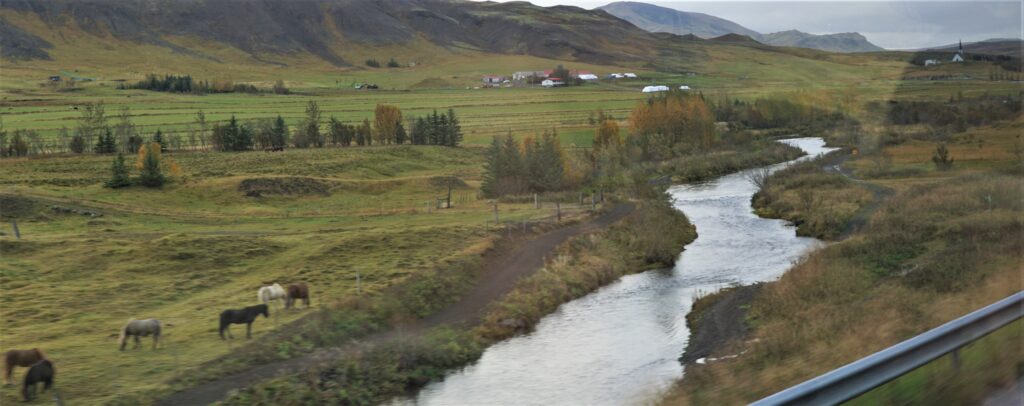
 Though the first horses were brought to Iceland by Norse settlers in the 900s, the horses you see today are a result of selective breeding over the centuries. Highly fertile and long-lived, they are “bred to the task” -some solely for horsemeat; some for pack and draft work; some for work under saddle. The Icelandic is a “five-gaited” breed – the walk, trot, and gallop that most horses do, plus the tolt and the flying pace. The tolt is a natural gait present from birth;
Though the first horses were brought to Iceland by Norse settlers in the 900s, the horses you see today are a result of selective breeding over the centuries. Highly fertile and long-lived, they are “bred to the task” -some solely for horsemeat; some for pack and draft work; some for work under saddle. The Icelandic is a “five-gaited” breed – the walk, trot, and gallop that most horses do, plus the tolt and the flying pace. The tolt is a natural gait present from birth;  it offers a smooth fast ride with no bounce; imagine the comfort in that! The flying pace is used for racing; horses that can perform both gaits are considered the best of the breed. The first breed society for the Icelandic horse was created in Iceland in 1904; today the breed is represented by organizations in 19 different nations, organized under the International Federation of Icelandic Horse Associations.
it offers a smooth fast ride with no bounce; imagine the comfort in that! The flying pace is used for racing; horses that can perform both gaits are considered the best of the breed. The first breed society for the Icelandic horse was created in Iceland in 1904; today the breed is represented by organizations in 19 different nations, organized under the International Federation of Icelandic Horse Associations.
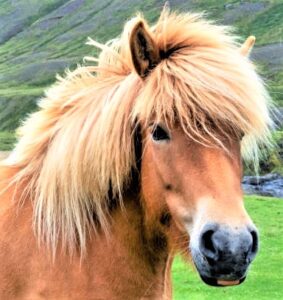 “Would you go horseback riding here if we had another day?” I asked Rick on the way back to our hotel. “Maybe,” he said. “The tolt sure sounds like a smoother ride than a 4×4.” Now there’s a thought! Tradition says you should never ride a horse whose name you don’t know, or understand. “You’d have to check out the horse’s name with the guide,” I told him. “Pick one named Farfús, it means likes to travel.”
“Would you go horseback riding here if we had another day?” I asked Rick on the way back to our hotel. “Maybe,” he said. “The tolt sure sounds like a smoother ride than a 4×4.” Now there’s a thought! Tradition says you should never ride a horse whose name you don’t know, or understand. “You’d have to check out the horse’s name with the guide,” I told him. “Pick one named Farfús, it means likes to travel.”
Our Farfús days are near the end. Tomorrow we go home. “Let’s pack,” was our goodnight. I’ve got more to tell you about Icelandic names, however. Next post?
WorldFeng Studbook of Origin https://www.worldfengur.com/
Center Hotels Plaza, Reykjavik, Iceland https://www.centerhotels.com/en/hotel-plaza-reykjavik
Next Post: Sons and Dottirs
» posted on Friday, September 30th, 2022 by Linda Lou Burton
The Golden Circle – Gullfoss
Linda Lou Burton posting from Center Hotels Plaza, Reykjavik, Iceland – I like a good story. 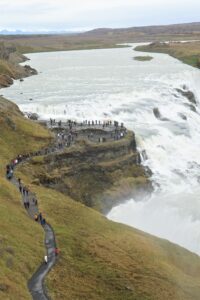 And this one is pretty good, in fact, it’s legendary. While Rick was riding the bus around the southwestern part of Iceland on the Golden Circle Tour, getting wet in the rain, and geyser spray, and waterfall mist, I spent some time (between naps) reading about what he was seeing. “Did the Tour Guide tell you about Tomas Tomasson and his daughter Sigridur Tomasdottir?” I asked him when he got back to the hotel. He shook his head. “No, but I want to tell you about the Icelandic horses we saw.” Since we had stories to swap, we decided to head for what was now our favorite restaurant (just across the street), and talk while enjoying the lamb dinner we’d promised ourselves. Saeta Svinid (Sweet Pig) was buzzing, a good Friday night crowd, and we got our orders in quickly: lamb shoulder slow cooked for 12 hours, perfect for two to share, and oven-baked lobster tails with sweetcorn-chili salsa. I told my story first.
And this one is pretty good, in fact, it’s legendary. While Rick was riding the bus around the southwestern part of Iceland on the Golden Circle Tour, getting wet in the rain, and geyser spray, and waterfall mist, I spent some time (between naps) reading about what he was seeing. “Did the Tour Guide tell you about Tomas Tomasson and his daughter Sigridur Tomasdottir?” I asked him when he got back to the hotel. He shook his head. “No, but I want to tell you about the Icelandic horses we saw.” Since we had stories to swap, we decided to head for what was now our favorite restaurant (just across the street), and talk while enjoying the lamb dinner we’d promised ourselves. Saeta Svinid (Sweet Pig) was buzzing, a good Friday night crowd, and we got our orders in quickly: lamb shoulder slow cooked for 12 hours, perfect for two to share, and oven-baked lobster tails with sweetcorn-chili salsa. I told my story first.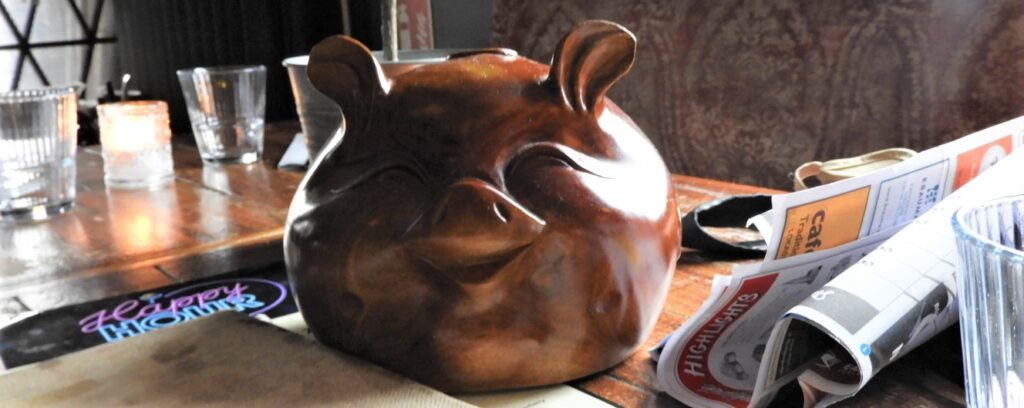
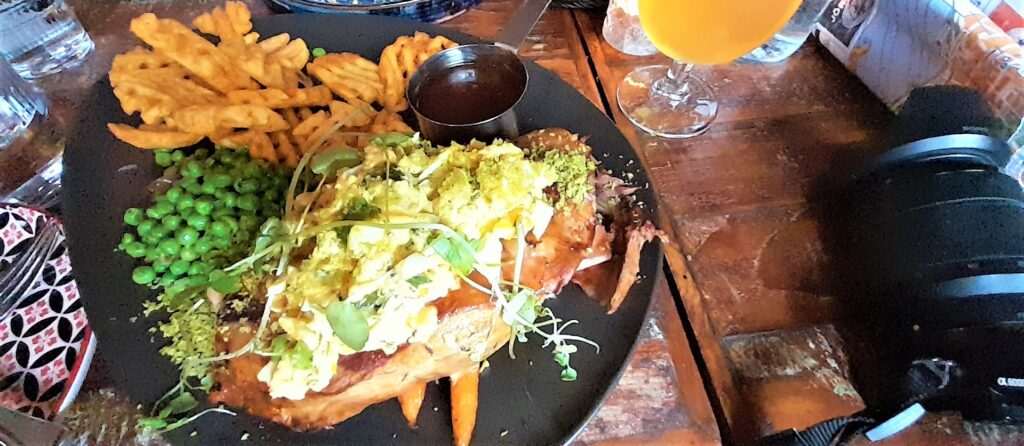
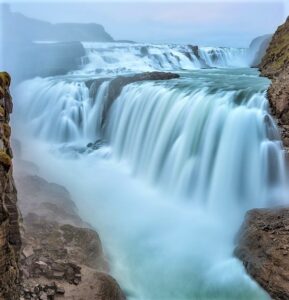 Gullfoss, translated Golden Falls, Rick’s third major stop today, isn’t Iceland’s biggest waterfall, but it is a showstopper, a roaring spectacle that angles water left and then right as it plunges down a curved three-step staircase into Gullfossgifur canyon. It’s the Hvita River, coming from the Langiokull glacier; walkways down and around let you get close enough for a good drenching by Mother Nature’s power. In 1907 that power caught the attention of an English businessman by the name of Howell who wanted to build a hydroelectric plant there. At the time, a farmer named Tomas Tomasson owned Gullfoss and staunchly refused to sell; though eventually he leased some of the land to Howell, not realizing the contract had a loophole favoring Howell — oops. Sigridur Tomasdottir, who grew up on her
Gullfoss, translated Golden Falls, Rick’s third major stop today, isn’t Iceland’s biggest waterfall, but it is a showstopper, a roaring spectacle that angles water left and then right as it plunges down a curved three-step staircase into Gullfossgifur canyon. It’s the Hvita River, coming from the Langiokull glacier; walkways down and around let you get close enough for a good drenching by Mother Nature’s power. In 1907 that power caught the attention of an English businessman by the name of Howell who wanted to build a hydroelectric plant there. At the time, a farmer named Tomas Tomasson owned Gullfoss and staunchly refused to sell; though eventually he leased some of the land to Howell, not realizing the contract had a loophole favoring Howell — oops. Sigridur Tomasdottir, who grew up on her  father’s sheep farm, was determined to preserve the land; she hired a lawyer and the fight began. The case continued for many years; as the story goes, Sigridur walked to Reykjavik (62 miles) many times, even threatening to throw herself into the waterfall if any construction began. She eventually succeeded! In 1929 Howell withdrew from the lease and the waterfall came back into the hands of the Icelandic people. Sigridur is hailed as “Iceland’s first environmentalist” and her contribution is marked in stone – a plaque bearing her image sits at the top of Gullfoss. And the lawyer who helped Sigridur? He became the first president of an independent Iceland in 1944! Good story, I say. Good job Sigridur!
father’s sheep farm, was determined to preserve the land; she hired a lawyer and the fight began. The case continued for many years; as the story goes, Sigridur walked to Reykjavik (62 miles) many times, even threatening to throw herself into the waterfall if any construction began. She eventually succeeded! In 1929 Howell withdrew from the lease and the waterfall came back into the hands of the Icelandic people. Sigridur is hailed as “Iceland’s first environmentalist” and her contribution is marked in stone – a plaque bearing her image sits at the top of Gullfoss. And the lawyer who helped Sigridur? He became the first president of an independent Iceland in 1944! Good story, I say. Good job Sigridur!
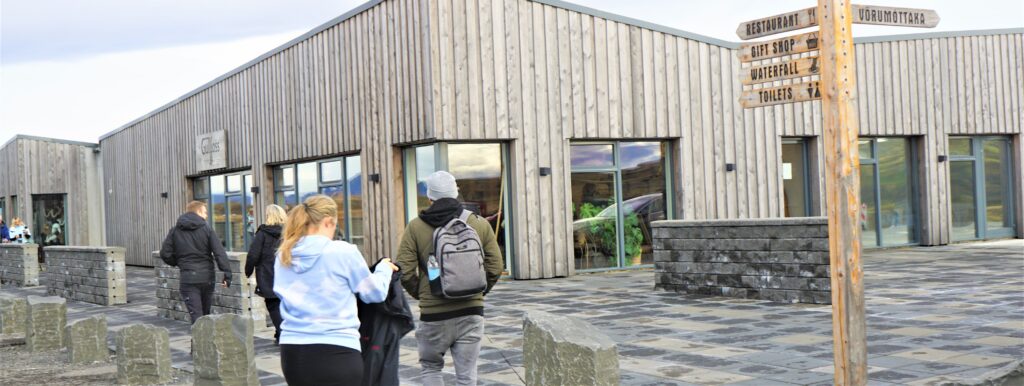 “Did you eat lunch at the Gullfoss Restaurant today? It overlooks the falls, doesn’t it?” I asked Rick. “No, I skipped lunch,” he answered. “The restaurant looked nice but the line was long and we only had a 45-minute stop. I chose to spend my time looking at the falls.” No wonder our slow-cooked lamb dinner was disappearing so fast! We were both starving and it was primo delicious. Rick’s photos below, his story of the Icelandic horses in the next post.
“Did you eat lunch at the Gullfoss Restaurant today? It overlooks the falls, doesn’t it?” I asked Rick. “No, I skipped lunch,” he answered. “The restaurant looked nice but the line was long and we only had a 45-minute stop. I chose to spend my time looking at the falls.” No wonder our slow-cooked lamb dinner was disappearing so fast! We were both starving and it was primo delicious. Rick’s photos below, his story of the Icelandic horses in the next post.
Golden Circle Tours https://www.re.is/golden-circle-tours/
Center Hotels Plaza, Reykjavik, Iceland https://www.centerhotels.com/en/hotel-plaza-reykjavik
Next Post: A Horse Of Course
» posted on Friday, September 30th, 2022 by Linda Lou Burton
The Golden Circle – Thingvellir
Linda Lou Burton posting from Center Hotels Plaza, Reykjavik, Iceland – Geysir, Gullfoss and Thingvellir. Are you up on your Icelandic? These are the names of sights you see on the Golden Circle bus tour. “Golden Circle” is the marketing term for a loop drive of 190 miles departing Reykjavik and circling back; it takes about six hours so is very popular for folks (like us) who only have a short time to stay. And it provides great exposure to the countryside with stops at three of Iceland’s most unique areas – Geysir, Gullfoss and Thingvellir. There was an exhibit about Thingvellir in Perlan we saw yesterday, where its significance began to sink in.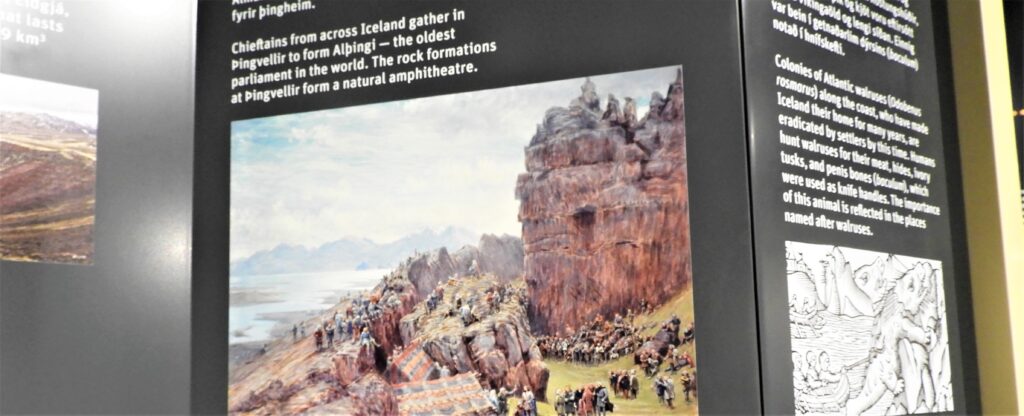
Chieftains from across Iceland gather in Thingvellir to form Althing – the oldest parliament in the world. The rock formations at Thingvellir form a natural amphitheater.
The year was 930! From 930 AD until 1798, Thingvellir was the assembly site for the national parliament of Iceland, the Althing, from which Thingvellir (Assembly Plains) derives its name. The assembly was a forum to recite laws and make amendments, resolve conflicts and feuds, and make trade and marriage arrangements. The acoustics of the canyon walls helped speakers voices carry further. This spot is so important to Iceland’s history it is a protected national shrine. Legislation passed in 1928 created Thingvellir National Park.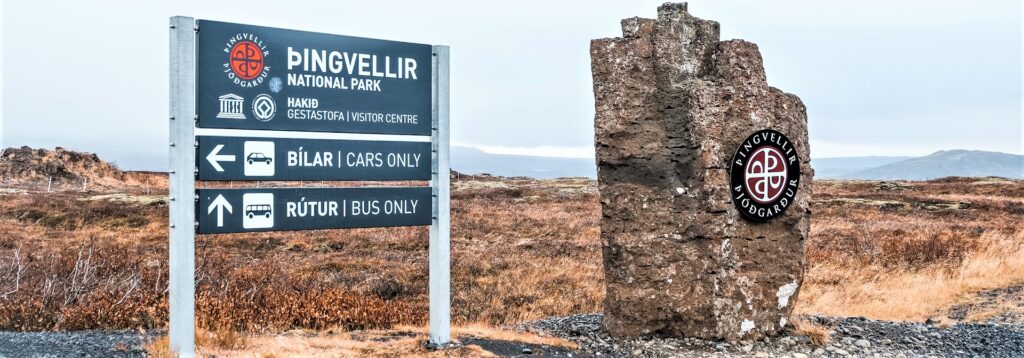
The Park has been declared a UNESCO WORLD HERITAGE SITE not only for its historical significance but its geological uniqueness as well. The area lies directly on the mid-Atlantic ridge, where those North American and Eurasian tectonic plates are slowly separating. Many enormous rifts and canyons are above water, but some of the fissures, such as Silfra, are now submerged. You can make arrangements (if you have proper diving credentials) to swim between these plates in the clearest water on earth — touch North America, then Europe! 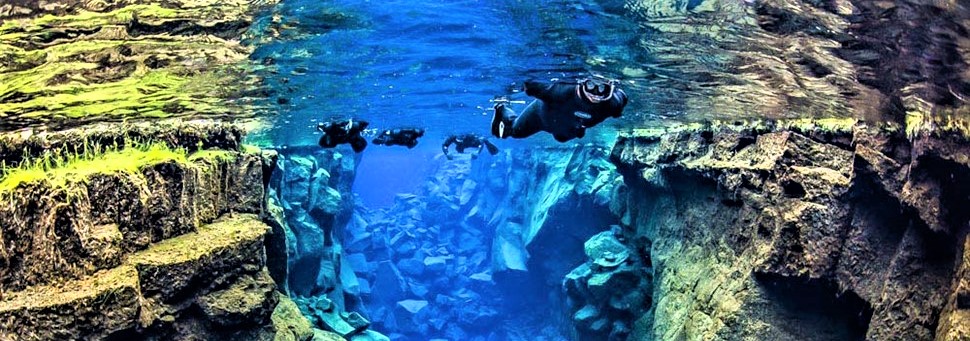
We weren’t planning on that, though I have family members that I’d like to encourage to “swim at Silfra.” Justin? Hal? Come with me when I make a trip back to Iceland. I have to come back because, rats again, I wasn’t able to go on the tour with Rick today. Twenty-one non-stop travel days took their toll, so the photos below are courtesy of Rick, who bundled up in his brown fleece and braved the wind to add yet another world-famous national park to his repertoire. Thanks Rick! See the cliffs of Thingvellir, and note that tiny church in the valley.
The first church was built here in 1015 following a gift of timber and a bell from King Olaf of Norway. The current church was built in 1859 and serves a small congregation today. The three bells in the tower are historic: one from that first church, one dating from 1697, and one added June 17, 1944, when the Icelandic republic was established at Thingvellir. The house beside the church serves as the summerhouse for the Prime Minister of Iceland.
Golden Circle Tours https://www.re.is/golden-circle-tours/
Thingvellir National Park https://www.thingvellir.is/en/things-to-do/
Diving at Silfra https://www.dive.is/dive-sites/silfra
Center Hotels Plaza, Reykjavik, Iceland https://www.centerhotels.com/en/hotel-plaza-reykjavik
Next Post: The Golden Circle – Geysir
» posted on Thursday, September 29th, 2022 by Linda Lou Burton
» posted on Thursday, September 29th, 2022 by Linda Lou Burton
Sky, Water And Life
Linda Lou Burton posting from Perlan, Reykjavik, Iceland – Florida and Iceland have a lot in common. Granted there aren’t any volcanoes in Florida, but when it comes to the Gulf Stream, the two are hand-holding partners. It seems almost illogical, a little bitty island far north in Arctic waters getting warmed by Gulf Stream waters, but it’s true. It all began back in the Cenozoic era, when the open waters between (what is now known as) North and South America closed up, redirecting the currents. Look at Perlan’s map, and explanation.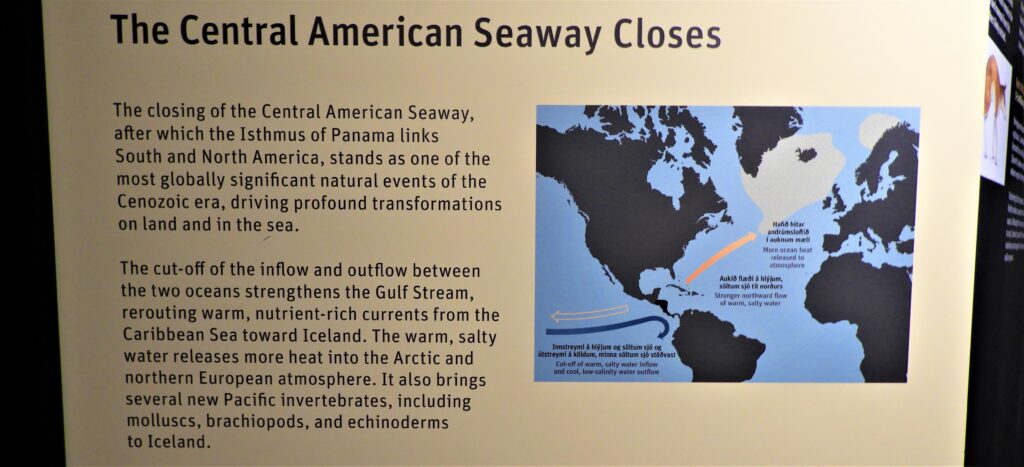
The Central American Seaway Closes. The closing of the Central American Seaway, after which the Isthmus of Panama links South and North America, stands as one of the most globally significant natural events of the Cenozoic era, driving profound transformations on land and in the sea. The cut-off of the inflow and outflow between the two oceans strengthens the Gulf Stream, rerouting warm, nutrient-rich currents from the Caribbean Sea toward Iceland. The warm, salty water releases more heat into the Arctic and northern European atmosphere. It also brings several new Pacific invertebrates, including molluscs, brachiopods, and echinoderms to Iceland.
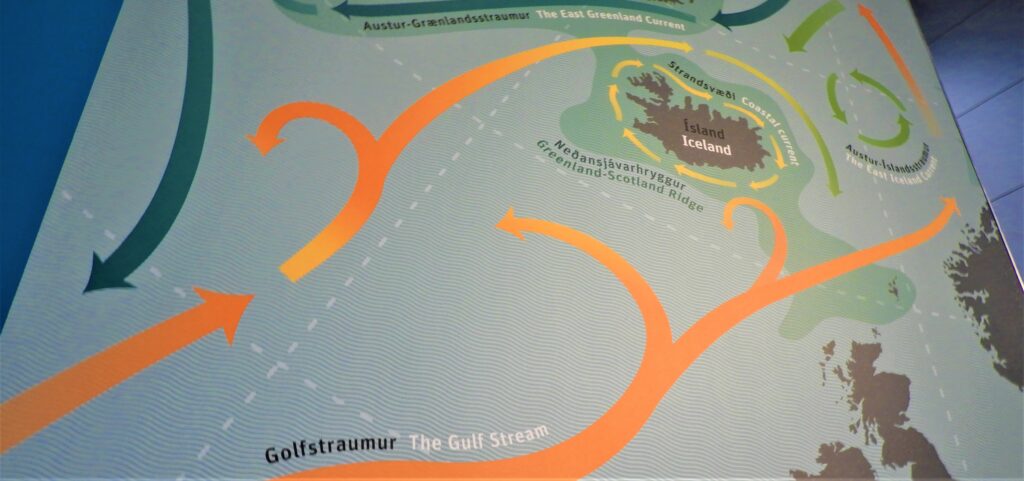 Ocean Currents. Iceland sits where three powerful ocean currents meet. The Gulf Stream brings warm, salty water from the south. The fast-moving East Greenland Current transports less salty, cold water to the Icelandic coast. The East Iceland Current brings more cold water south from the polar region.
Ocean Currents. Iceland sits where three powerful ocean currents meet. The Gulf Stream brings warm, salty water from the south. The fast-moving East Greenland Current transports less salty, cold water to the Icelandic coast. The East Iceland Current brings more cold water south from the polar region.
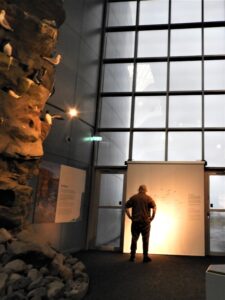 Perlan tells about Iceland’s fresh water too, with a Glacier Exhibit (more than a tenth of the country is covered in glaciers); a Water In Icelandic Nature exhibit, Underwater World, and even an Ice Cave to wander through. We wandered, looking up and looking down; sitting once in a while. The planetarium was my favorite; lots of sitting and IMAX surround featuring an incredible array of northern lights. I’m convinced now – Iceland isn’t gray at all! Its sky is colorful, its buildings are colorful, and there is a never-ending round of tours and activities waiting to show the country off.
Perlan tells about Iceland’s fresh water too, with a Glacier Exhibit (more than a tenth of the country is covered in glaciers); a Water In Icelandic Nature exhibit, Underwater World, and even an Ice Cave to wander through. We wandered, looking up and looking down; sitting once in a while. The planetarium was my favorite; lots of sitting and IMAX surround featuring an incredible array of northern lights. I’m convinced now – Iceland isn’t gray at all! Its sky is colorful, its buildings are colorful, and there is a never-ending round of tours and activities waiting to show the country off.
More coming up in other posts about geysers spewing, rivers flowing, and water falling and splashing (you can count 10,000 waterfalls!). One last point about water here: the water flowing from springs is considered among the cleanest in the world – filtered through layers of lava and rocks for decades. And then there’s that rain coming down, that we’ve witnessed today. As to what lives and grows in such an abundantly watered environment – I will tell you two things that don’t. There are no mosquitos or snakes in Iceland! There are sheep and goats and the interesting and unusual Icelandic horse. Seals and whales to tell about later, and the cute arctic fox, which was actually the first land mammal on the island. Stay tuned.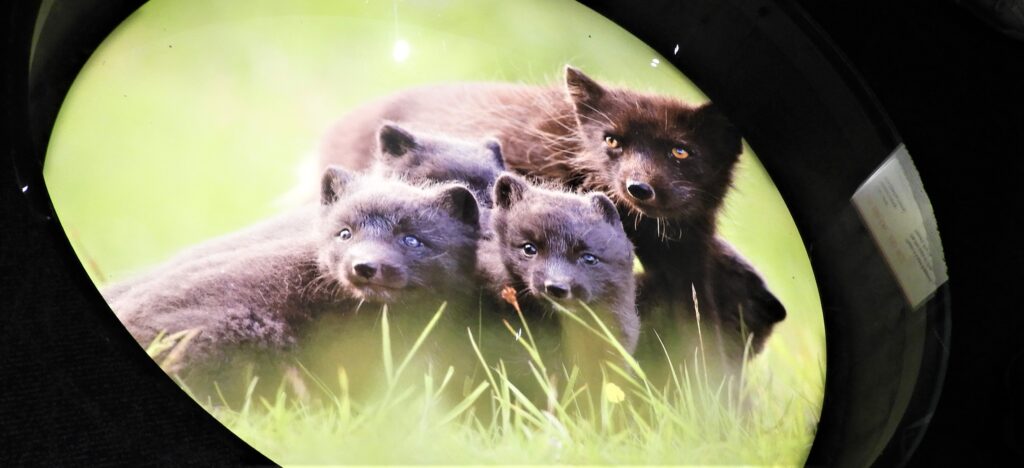
The first two photos are from Perlan’s coverage of the Aurora Borealis which includes myths and stories about the showy skies. The last photo isn’t from Perlan but something I found online showing a favorite pastime for Icelanders – relaxing in a nice warm geothermal pool or hottub under the beautiful nighttime sky. Seriously! See what I mean about color?
Perlan https://www.perlan.is/
Center Hotels Plaza, Reykjavik, Iceland https://www.centerhotels.com/en/hotel-plaza-reykjavik
Next Post: The Flyover
» posted on Thursday, September 29th, 2022 by Linda Lou Burton
Earth, Wind And Fire
Linda Lou Burton posting from Perlan, Reykjavik, Iceland – I am rendered speechless. Bet you thought you’d never hear me say that. But when it comes to volcanoes, the forces of nature can overwhelm. A volcano is the attention-getter in the room, the loud, showy extrovert that demands to be noticed. And Iceland is, pure and simple, a hunk of volcanic aftermath. Which keeps on growing. And going. Remember the Great Rift Valley in Africa, where we’ve been hanging out the last few weeks? Tectonic Plates, continental 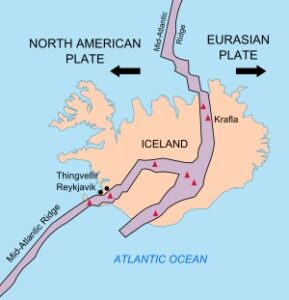 movement? The same thing is going on in Iceland — it straddles the North American and Eurasian plates, and they are moving apart. And below that rift/underwater crack is a magma hotspot (the Iceland Plume) that results in Iceland being one of the most active volcanic regions in the world. They have a volcanic eruption about every three years – one happened near Keflavik airport in August but calmed down just before we got here. There are about 30 active volcanic systems on this small island today. I won’t get into the details of types or activity (as I’m speechless about the whole thing), but Perlan’s exhibits can set you thinking. Here are the pictures I took and “what’s happening” in their own words and descriptions.
movement? The same thing is going on in Iceland — it straddles the North American and Eurasian plates, and they are moving apart. And below that rift/underwater crack is a magma hotspot (the Iceland Plume) that results in Iceland being one of the most active volcanic regions in the world. They have a volcanic eruption about every three years – one happened near Keflavik airport in August but calmed down just before we got here. There are about 30 active volcanic systems on this small island today. I won’t get into the details of types or activity (as I’m speechless about the whole thing), but Perlan’s exhibits can set you thinking. Here are the pictures I took and “what’s happening” in their own words and descriptions.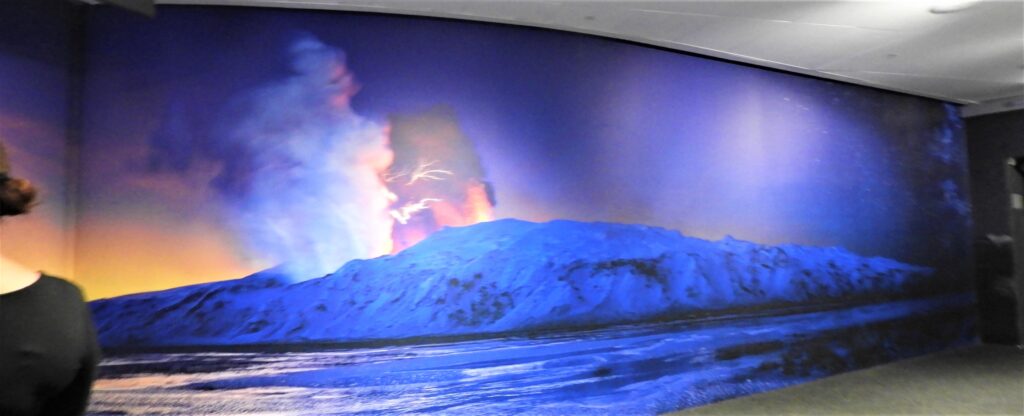
Iceland’s volcanoes, earthquakes, and glaciers keep it geologically young, active, and spectacularly beautiful. Land is created and destroyed here faster than anywhere else in the world. Straddling divergent tectonic plates, Iceland stretches by about two centimeters per year. The sea erodes the shore at about the same rate. Mountains, islands, lakes and gorges come, go, and transform. It’s a land whose story always seems to be starting a new chapter.
Continents drift. The ocean widens. The land bridge can no longer survive. The mantle plume props up the western arm of the land bridge, but it ultimately crumbles and tumbles into the ocean. Only Iceland endures, an island at last, riding the very forces that destroyed the land around it. Furious volcanoes, earthquakes, and glaciers continuously renew and reshape isolated Iceland, replenishing rock and soil as quickly as they are worn away.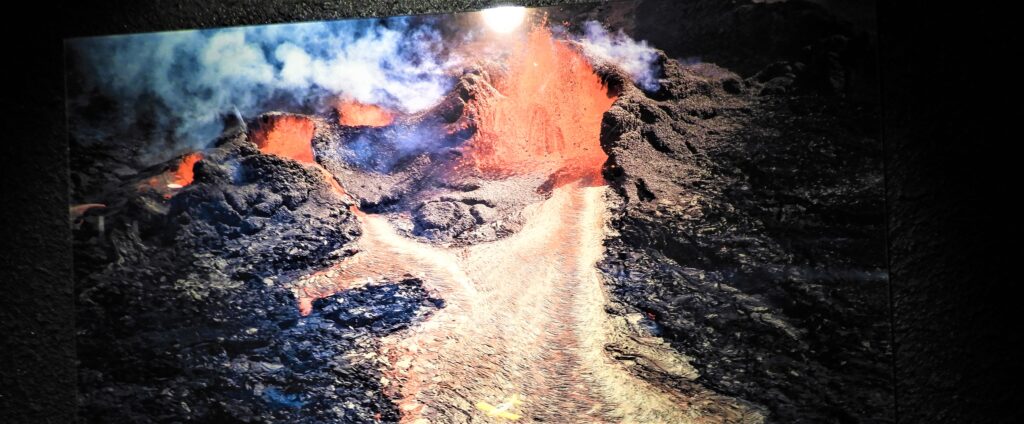
Now let me switch floors in this beautiful building full of Iceland’s wonders so I can show you the aurora borealis (beautiful sky!), the story of water, and the life that exists in this splendor.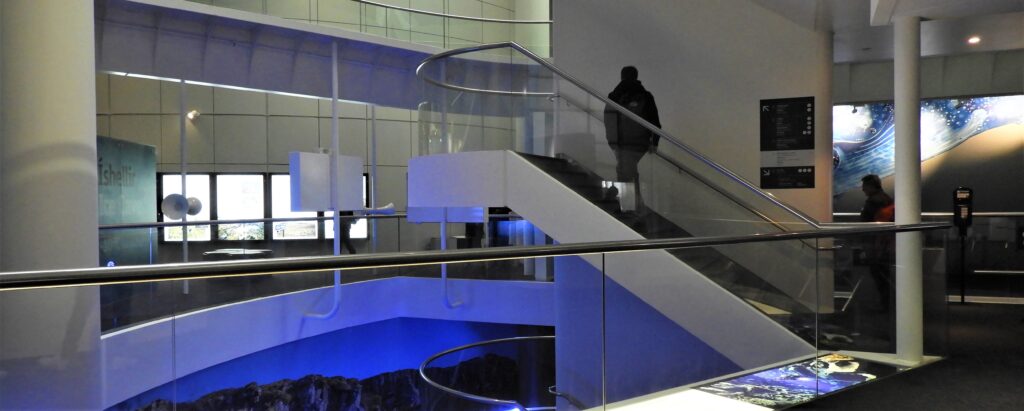
Next Post: Sky, Water and Life
Perlan https://www.perlan.is/
Center Hotels Plaza, Reykjavik, Iceland https://www.centerhotels.com/en/hotel-plaza-reykjavik
» posted on Thursday, September 29th, 2022 by Linda Lou Burton
Domed If We Do
Linda Lou Burton posting from Perlan, Reykjavik, Iceland – It was raining a goodly amount this morning; breakfast in the cozy basement of our hotel was splendid, tables piled with skyr 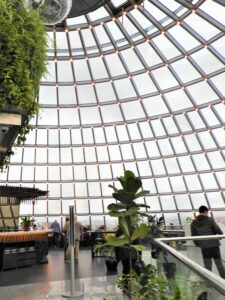 (thicker than yogurt) and pylsur (sausage) and eggs and fruits and rich dark breads just waiting to be buttered. Steaming hot coffee, tall urn. But the windows upstairs framed rain. So what do you do when it rains a lot? Make your windows bigger, in fact, dome up so the entire sky above your head is visible in every direction. Add a motorized device to rotate you slowly over an hour so you can see every horizon, no matter what the weather. Soak it up! That’s what they’ve done in Reykjavik at Perlan’s domed restaurant, high on a hill above town, high atop a museum of such awesome natural wonders you have to keep going back (get an annual pass!); all of this high atop six tanks filled with water, which is, well, sort of what started the entire enterprise.
(thicker than yogurt) and pylsur (sausage) and eggs and fruits and rich dark breads just waiting to be buttered. Steaming hot coffee, tall urn. But the windows upstairs framed rain. So what do you do when it rains a lot? Make your windows bigger, in fact, dome up so the entire sky above your head is visible in every direction. Add a motorized device to rotate you slowly over an hour so you can see every horizon, no matter what the weather. Soak it up! That’s what they’ve done in Reykjavik at Perlan’s domed restaurant, high on a hill above town, high atop a museum of such awesome natural wonders you have to keep going back (get an annual pass!); all of this high atop six tanks filled with water, which is, well, sort of what started the entire enterprise.
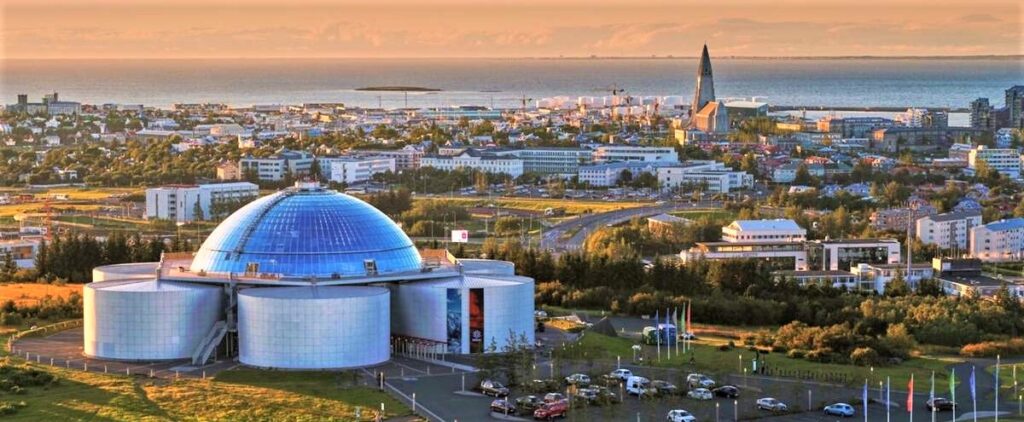 The “Pearl” as it is affectionately known, was designed by architect Ingimundi Sveinssson and opened in 1991. The first water tank, however, was built in 1939; high enough on the hill to provide ample pressure to serve the needs of the town. Tanks were added; today each of the six can hold over a million gallons of geothermal water. This hot water provides heating for homes, schools, municipal buildings, and, via a network of pipes under the pavement, keeps Reykjavik’s streets free of ice and snow in the winter. Building something on top of the tanks evolved from a 1930s idea to build a “temple” on that hill covered in mirror panels “so the northern lights could reach the people’s feet.” Function and beauty – ah! Johannes Kjarval, who was going for beauty, also proposed crystals on the roof and spotlights on the tanks so the building would respond both to the light of day and the symbols of night. The Pearl, which came about sixty years later, pretty much does all of that, and so much more.
The “Pearl” as it is affectionately known, was designed by architect Ingimundi Sveinssson and opened in 1991. The first water tank, however, was built in 1939; high enough on the hill to provide ample pressure to serve the needs of the town. Tanks were added; today each of the six can hold over a million gallons of geothermal water. This hot water provides heating for homes, schools, municipal buildings, and, via a network of pipes under the pavement, keeps Reykjavik’s streets free of ice and snow in the winter. Building something on top of the tanks evolved from a 1930s idea to build a “temple” on that hill covered in mirror panels “so the northern lights could reach the people’s feet.” Function and beauty – ah! Johannes Kjarval, who was going for beauty, also proposed crystals on the roof and spotlights on the tanks so the building would respond both to the light of day and the symbols of night. The Pearl, which came about sixty years later, pretty much does all of that, and so much more.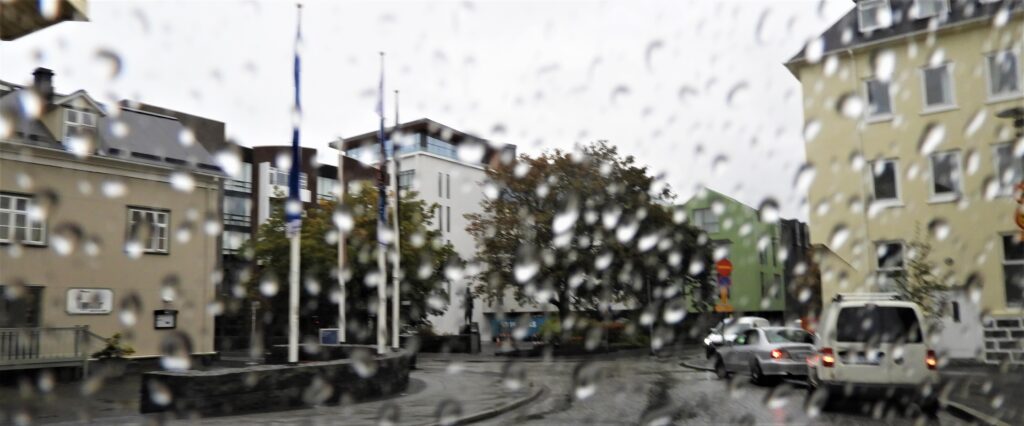
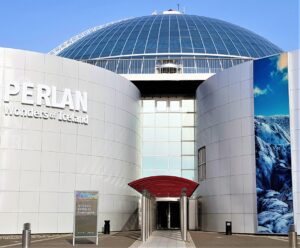 Perlan was at the top of my list for Reykjavik “must-dos,” so we stepped out the hotel door to a waiting taxi and rode through blowing rain. We bought tickets for “the works” – The Wonders of Iceland, giving us access to the Planetarium, the exhibits, the observation deck, and above it all, the fabulous domed restaurant. There is no possible place better to spend a rainy day. Or a sunny one. I’ll tell you about the exhibits in upcoming posts (there is so much to tell!). As to the restaurant itself, we both had tasty fish and chips, very nice; but it was the dome that held our attention. Some of the following photos are mine; some I found to show how the world looks when you choose to love it rain or shine, day or night, as they seem to have decided to do on a little island called Iceland.
Perlan was at the top of my list for Reykjavik “must-dos,” so we stepped out the hotel door to a waiting taxi and rode through blowing rain. We bought tickets for “the works” – The Wonders of Iceland, giving us access to the Planetarium, the exhibits, the observation deck, and above it all, the fabulous domed restaurant. There is no possible place better to spend a rainy day. Or a sunny one. I’ll tell you about the exhibits in upcoming posts (there is so much to tell!). As to the restaurant itself, we both had tasty fish and chips, very nice; but it was the dome that held our attention. Some of the following photos are mine; some I found to show how the world looks when you choose to love it rain or shine, day or night, as they seem to have decided to do on a little island called Iceland.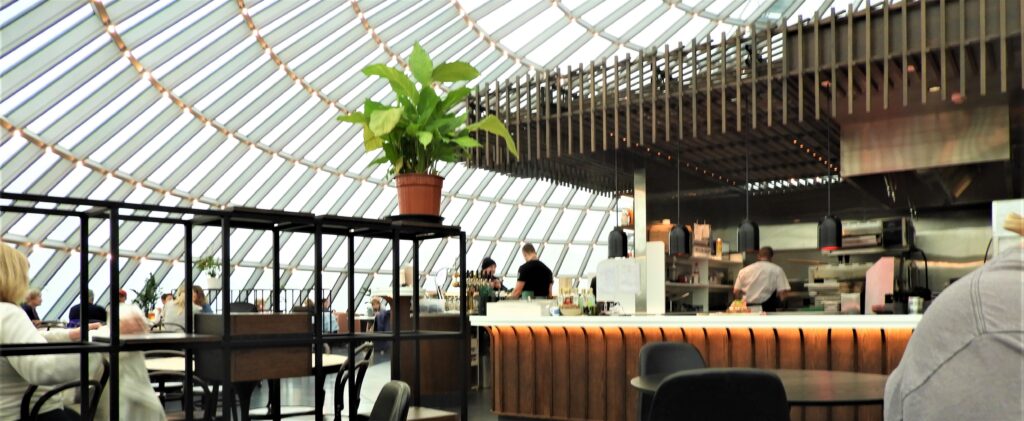
Perlan https://www.perlan.is/
Center Hotels Plaza, Reykjavik, Iceland https://www.centerhotels.com/en/hotel-plaza-reykjavik
Next Post: Earth, Wind and Fire
» posted on Wednesday, September 28th, 2022 by Linda Lou Burton
But Then,
Linda Lou Burton posting from Central Hotels Plaza, Reykjavik, Iceland – It’s dark and cold. We’re tired and hungry. We need to eat. “There’s no restaurant in the hotel,” we were advised at the front desk. “But they’re all around, just step outside the door.” Someone blew in off the street just then, zipped and wrapped, mittens and parka; he stopped at the sight of us. “You’re going to freeze out there!” he said. “You aren’t dressed for Iceland! How did you get here without a coat?” “We just left the Equator, and turned north,” we answered. He made a face at us, and next thing, we were all laughing, and exchanging travel routes. He was from Texas, as most of our safari gang had been. He pointed to a spot across the street, not thirty feet from the door of the hotel. “Go there,” he said. “It’s warm.” Truer words were never spoken.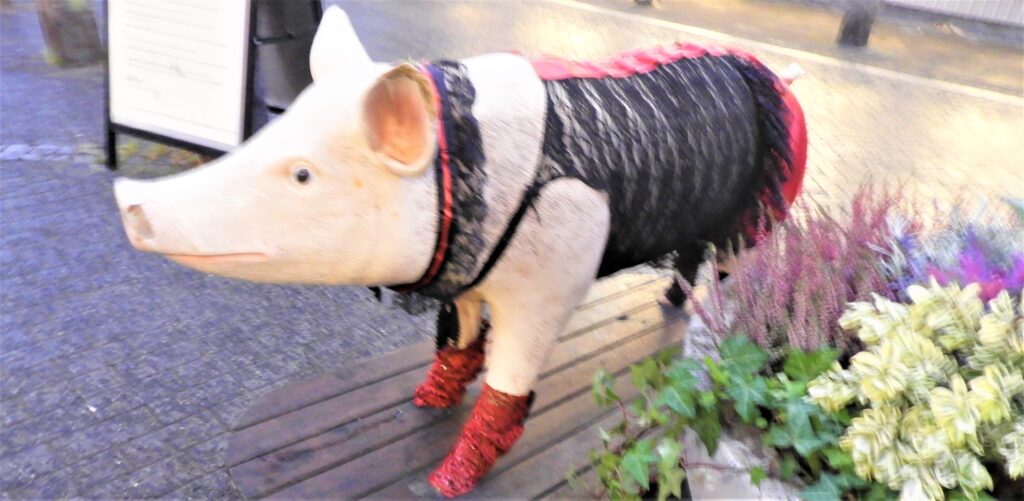
Saeta Svinid, aka Sweet Pig, calls itself an Icelandic Gastropub; they not only had a Sweet Pig out front decked in lacy red stockings, they had a sign enticing you in with a 7-course Tasting Menu consisting of the following:
- Shot of Icelandic Brennivin
- Smoked Puffin w crowberry liqueur sauce
- Minke Whale, smoky celeriac puree, malt sauce
- Icelandic Flatkaka Lightly cured artic char, cream cheese, dill, lemon oil
- Horse Carpaccio, dates, rucola-mayo, Jerusalem artichokes, Parmesan
- Ling, mashed potatoes, caper flowers, Dijon-butter sauce
- Icelandic Lamb Rump Steak, parma ham & herb crumble, mashed potatoes
- Icelandic Crowberry Cheesecake
While there is controversy about eating Iceland’s treasured puffins, and whales; horse is considered okey-dokey (though we couldn’t bear the thought!). We had no qualms about the fish or lamb however, and the red-stockinged pig staring at us sealed the deal. There was nothing gray in the Saeta Svinid. Everybody was happy houring; eating and drinking and laughing; the liveliest place we’d been in since, well, we couldn’t remember when.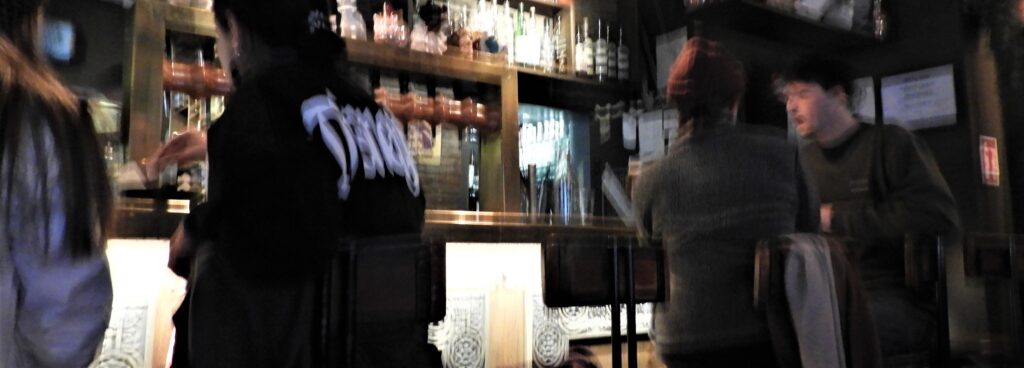
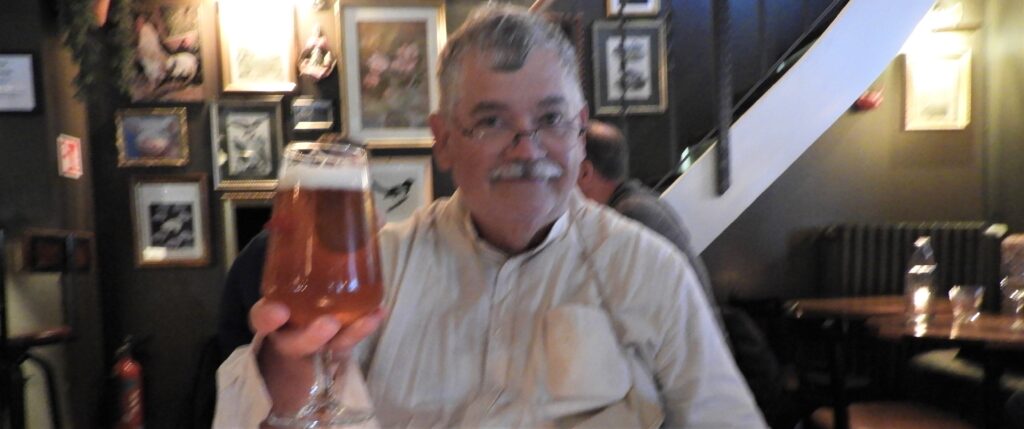
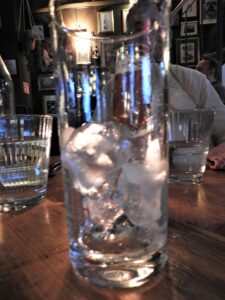 Rick ordered the Ling Cod and mashed potatoes; it came piled with asparagus and carrots. I ordered Gyoza –beef dumplings, hoisin sauce, pomegranate, spring onion, served on a hunk of slate. (It was so pretty I didn’t notice the gray.) The food was great, the ambiance was greater, but the real bonus for the evening came in a glass. It was ice! Due to Africa’s unpotable water, I hadn’t had an icy cold drink in two weeks. Iceland’s fresh clear spring water is delicious straight from the tap.
Rick ordered the Ling Cod and mashed potatoes; it came piled with asparagus and carrots. I ordered Gyoza –beef dumplings, hoisin sauce, pomegranate, spring onion, served on a hunk of slate. (It was so pretty I didn’t notice the gray.) The food was great, the ambiance was greater, but the real bonus for the evening came in a glass. It was ice! Due to Africa’s unpotable water, I hadn’t had an icy cold drink in two weeks. Iceland’s fresh clear spring water is delicious straight from the tap.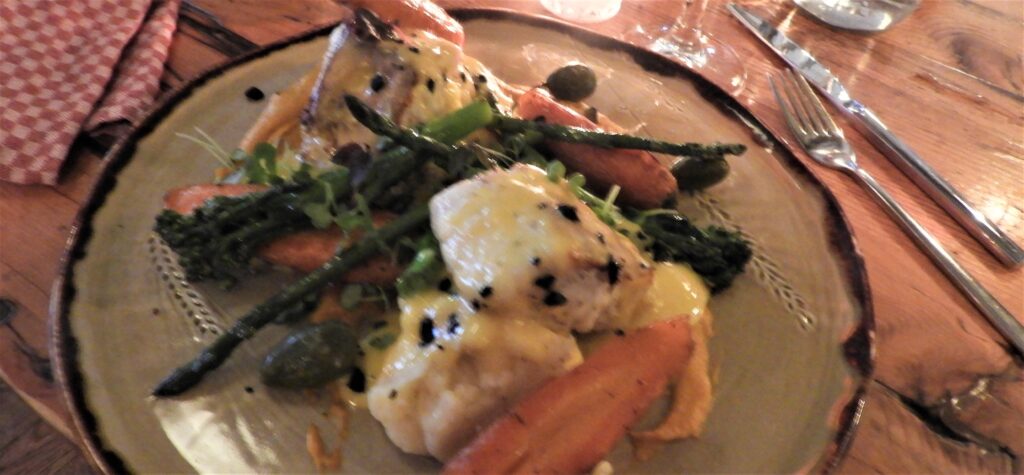
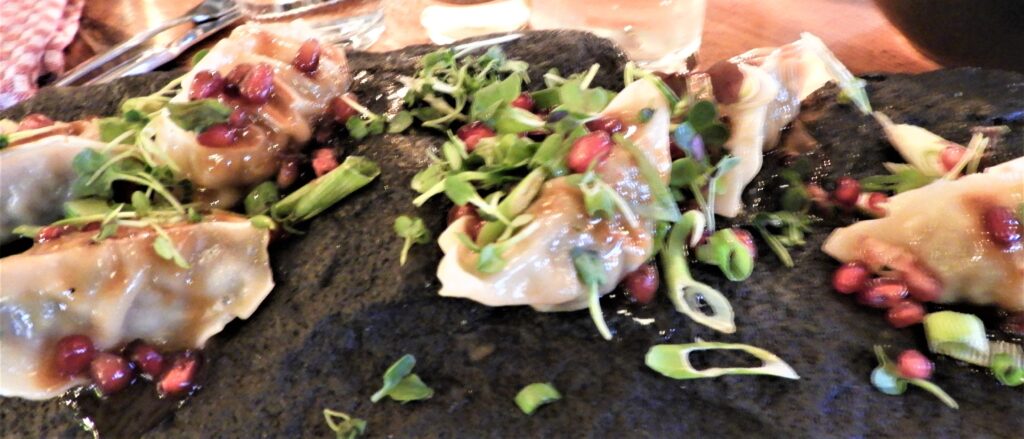
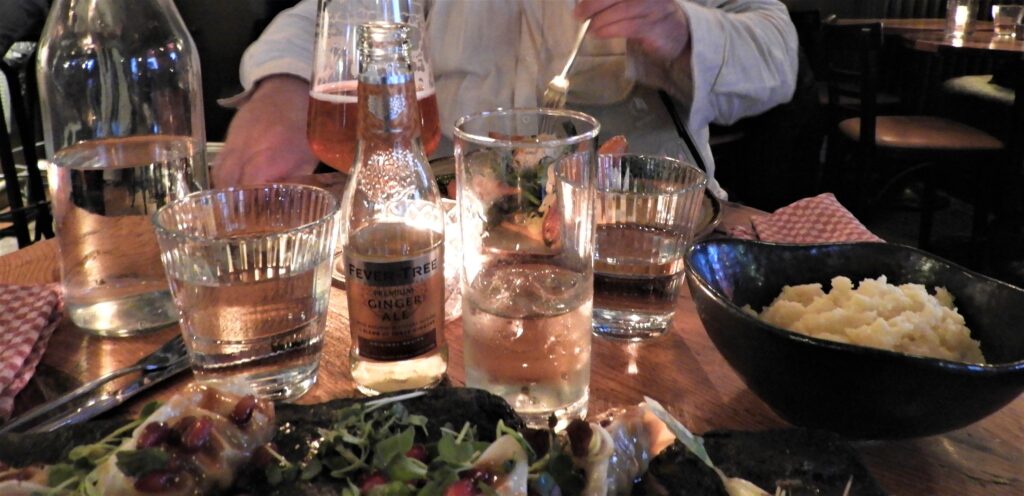 Bill paying time; our perky server handed me a receipt, the amount listed in Icelandic kronas. “I can’t read this,” I said to her. “And I need to figure your tip.” She laughed and shook her head. “There is no tipping in Iceland!” she said, and scooted off, to keep another customer smiling. The Sweet Pig was a mood lifter, no matter what you chose to eat. Or drink.
Bill paying time; our perky server handed me a receipt, the amount listed in Icelandic kronas. “I can’t read this,” I said to her. “And I need to figure your tip.” She laughed and shook her head. “There is no tipping in Iceland!” she said, and scooted off, to keep another customer smiling. The Sweet Pig was a mood lifter, no matter what you chose to eat. Or drink.
Back out in the cold, we took note of the square, directly across from the hotel. People were enjoying the evening. It was pretty. So this is Iceland, huh? If it’s gray turn on the lights. If its rainy, put on a coat. Gather with your friends. Eat scrumptiously. Paint your buildings red. 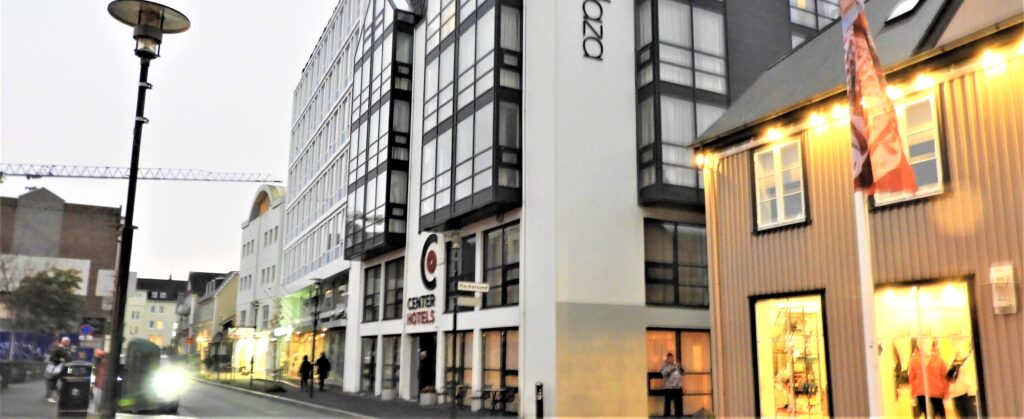
Center Hotels Plaza, Reykjavik, Iceland https://www.centerhotels.com/en/hotel-plaza-reykjavik
Saeta Svinid Icelandic Gastropub https://saetasvinid.is/
Next Post: Domed If We Do


